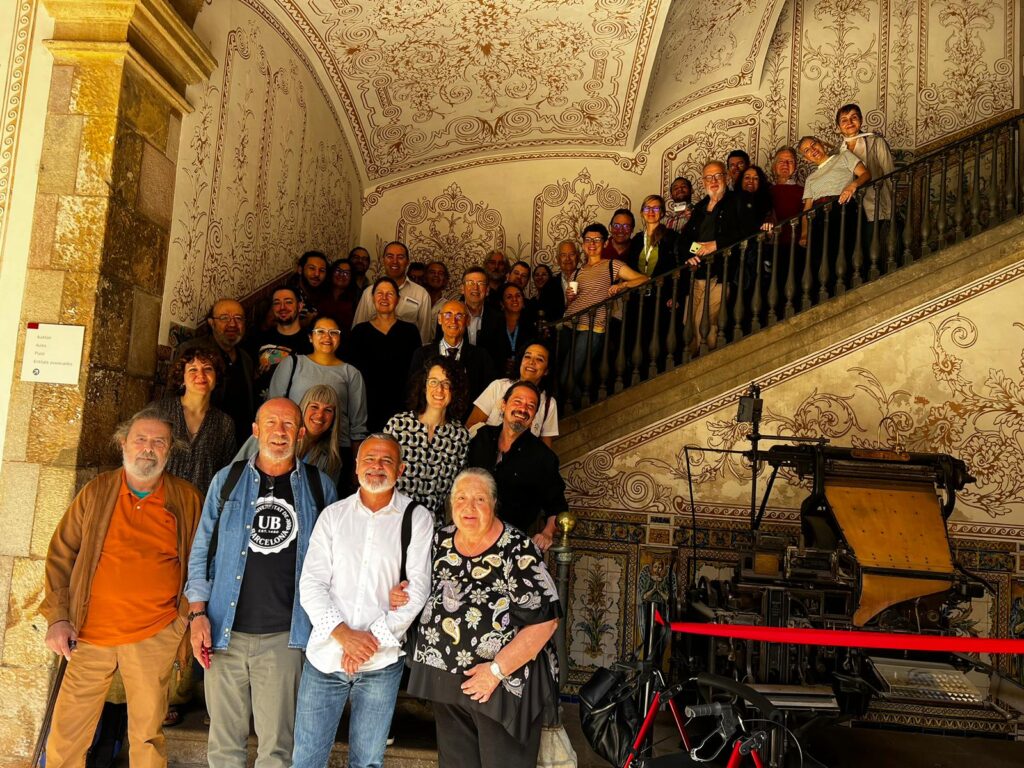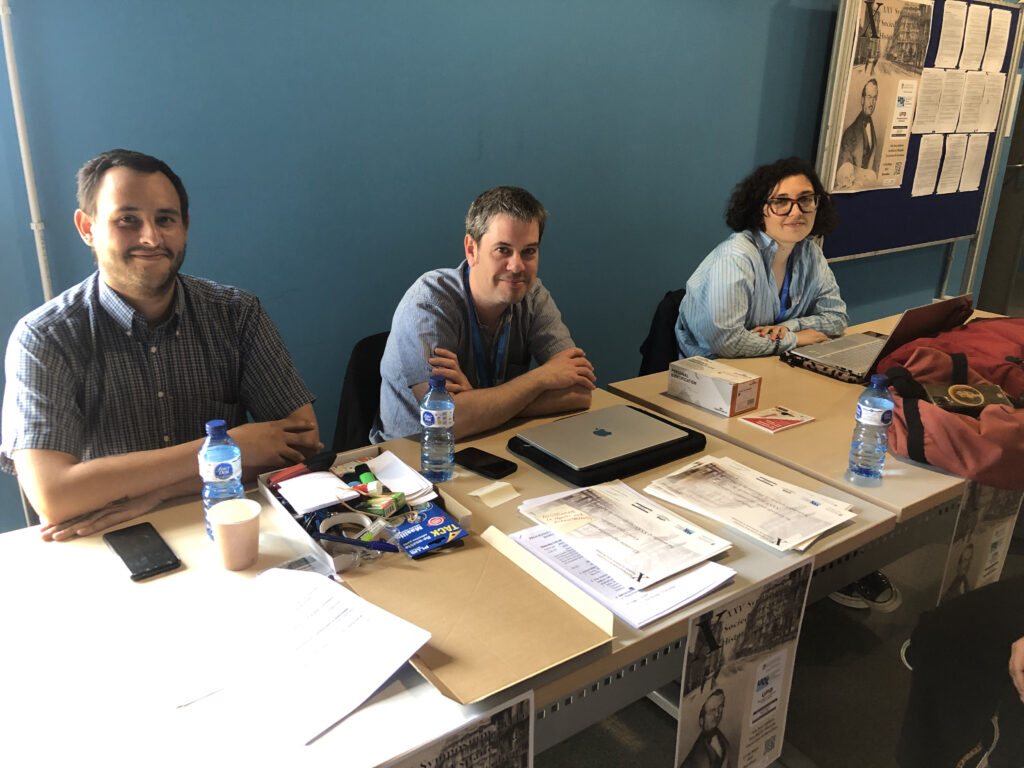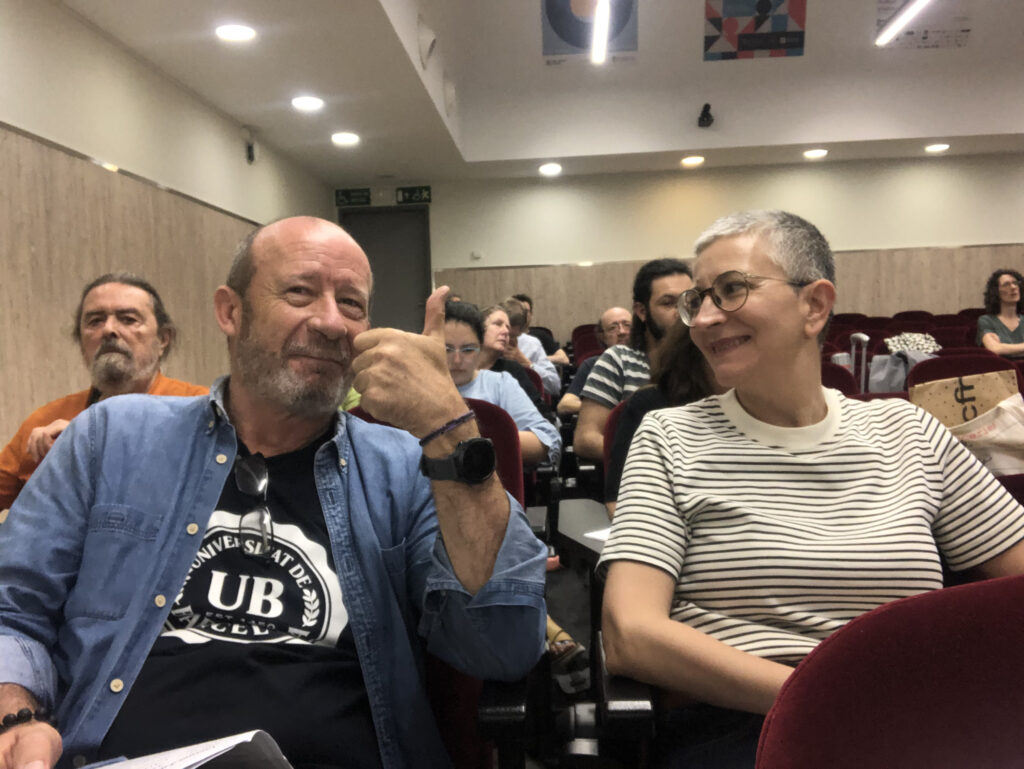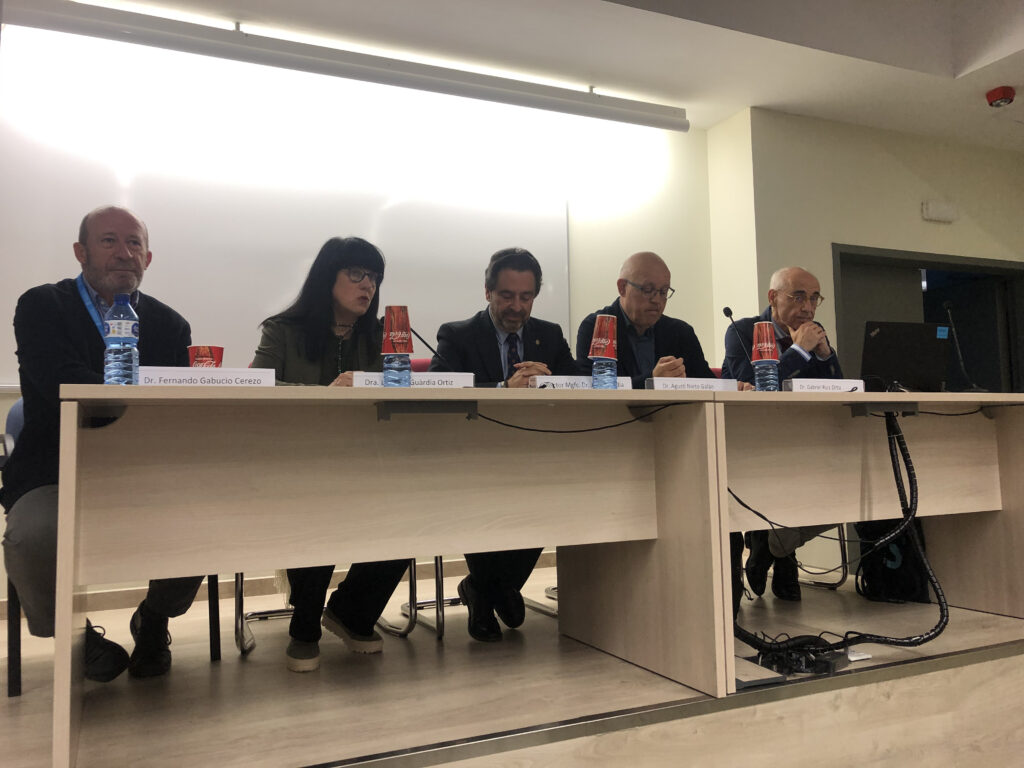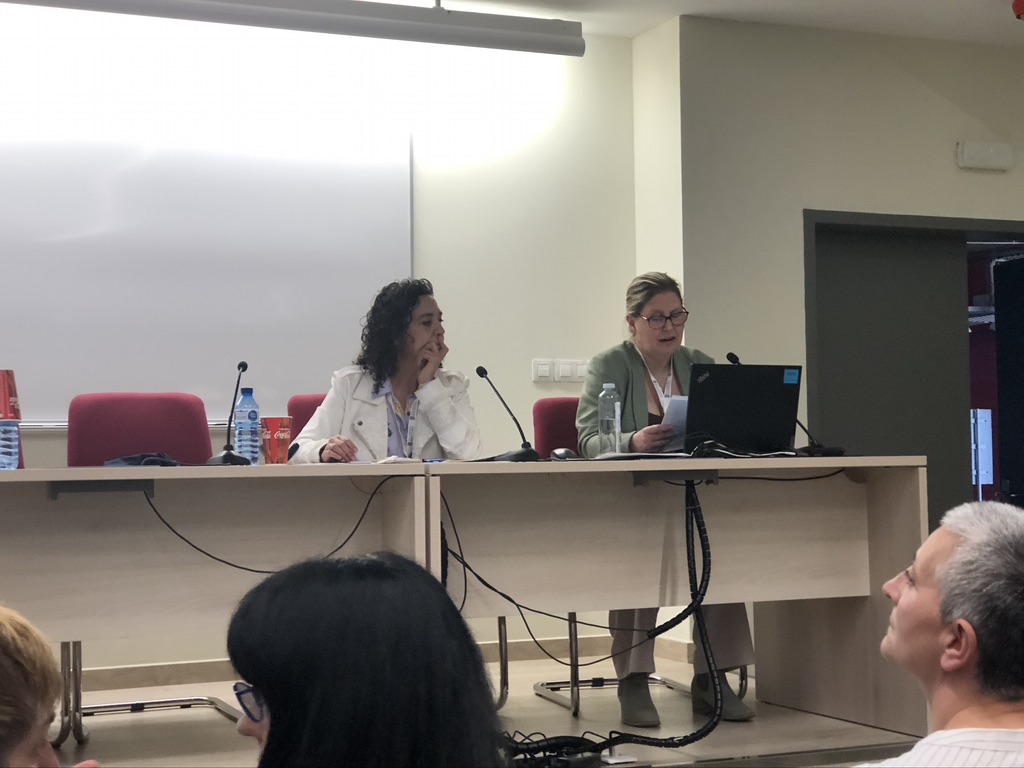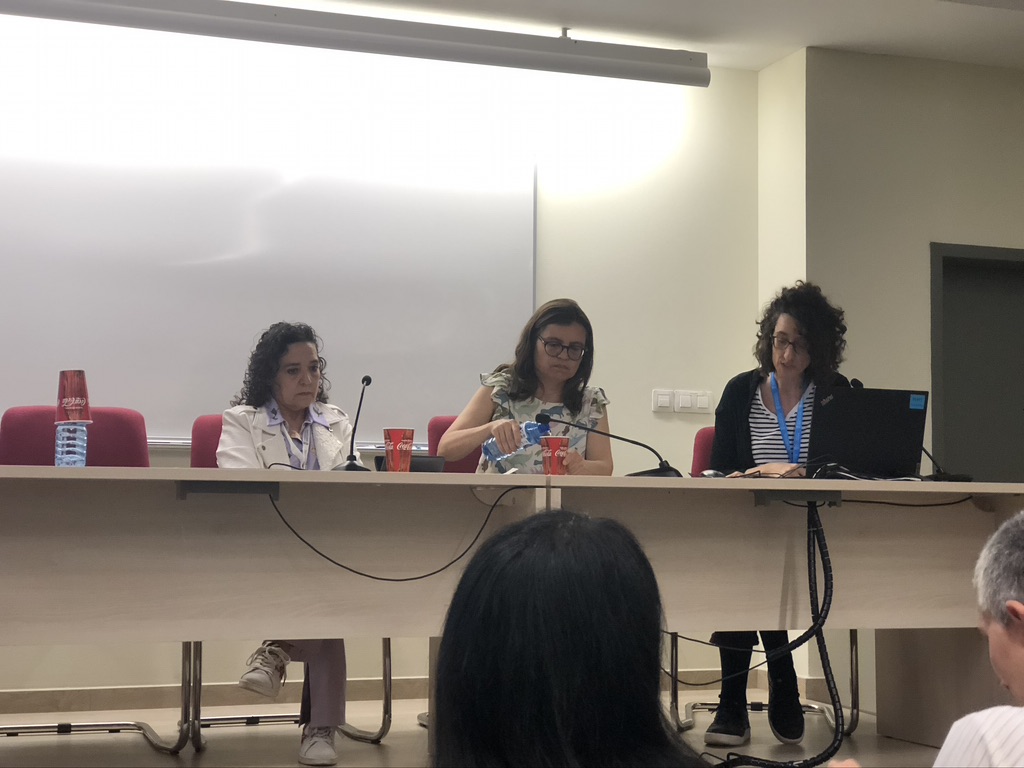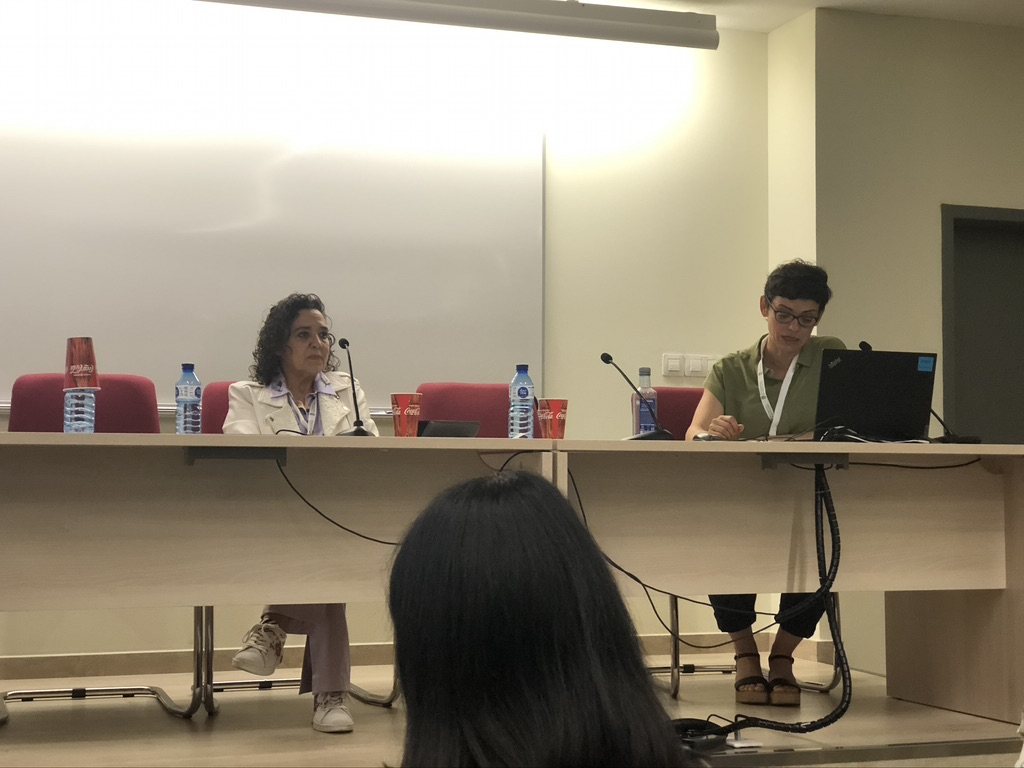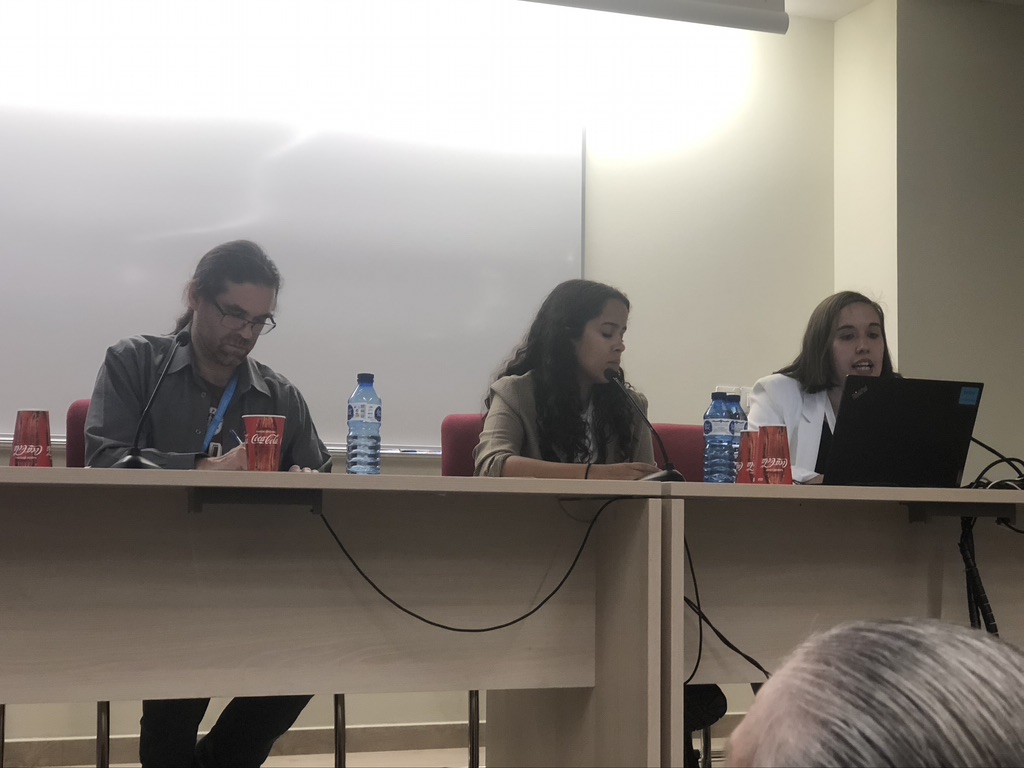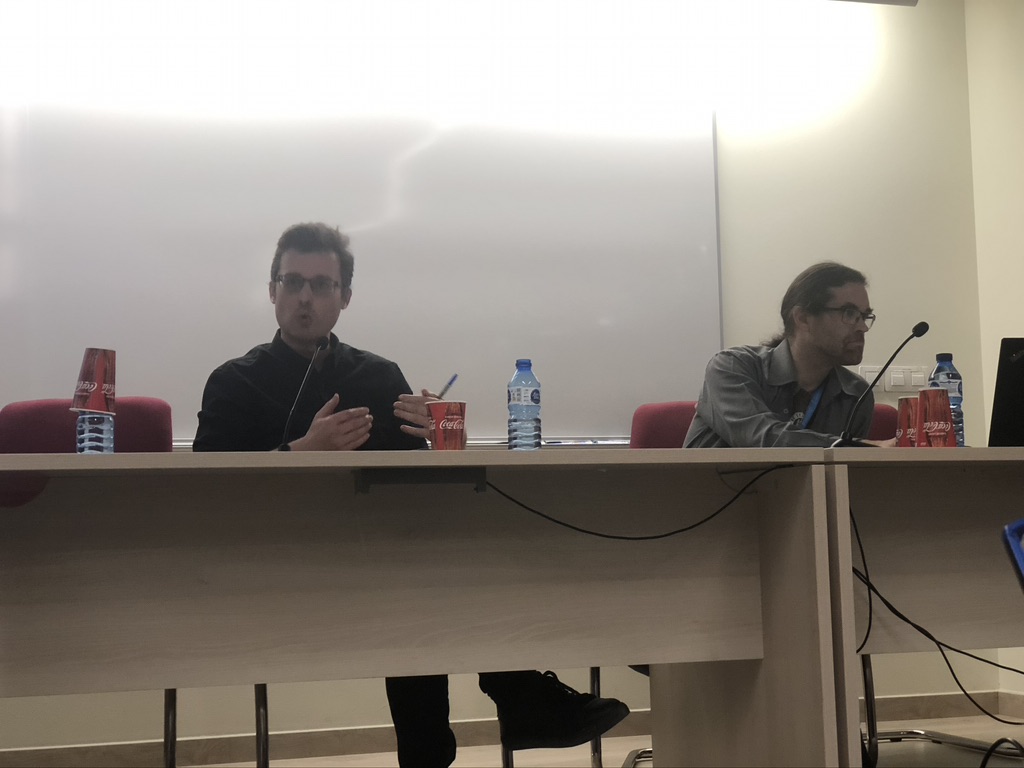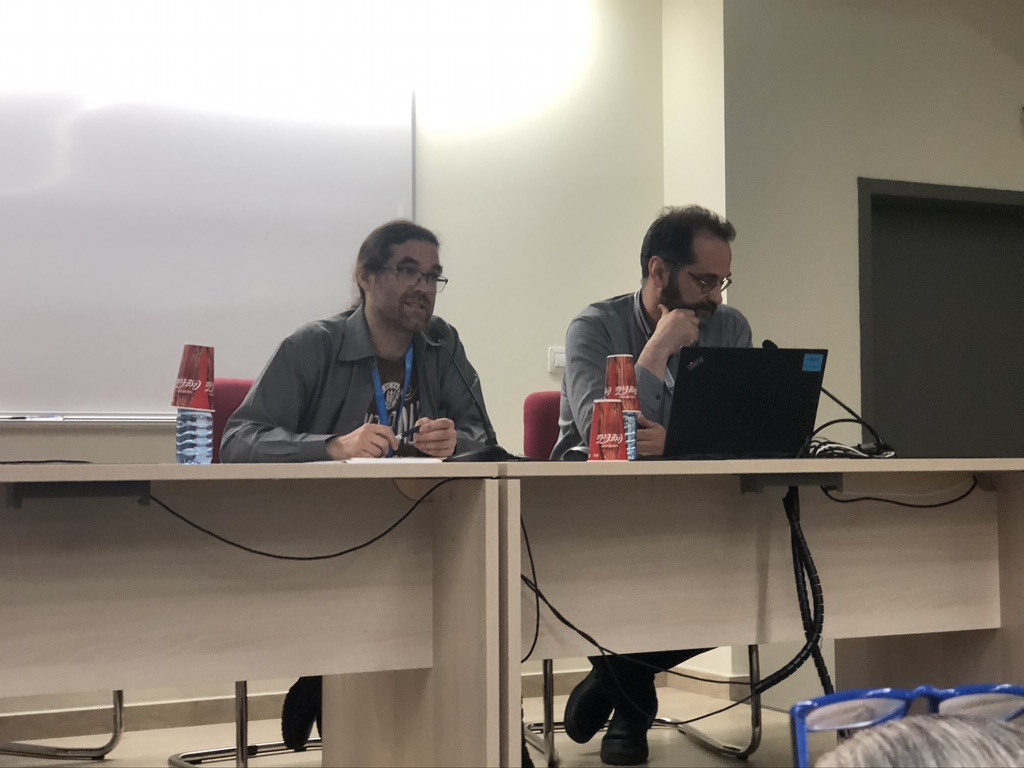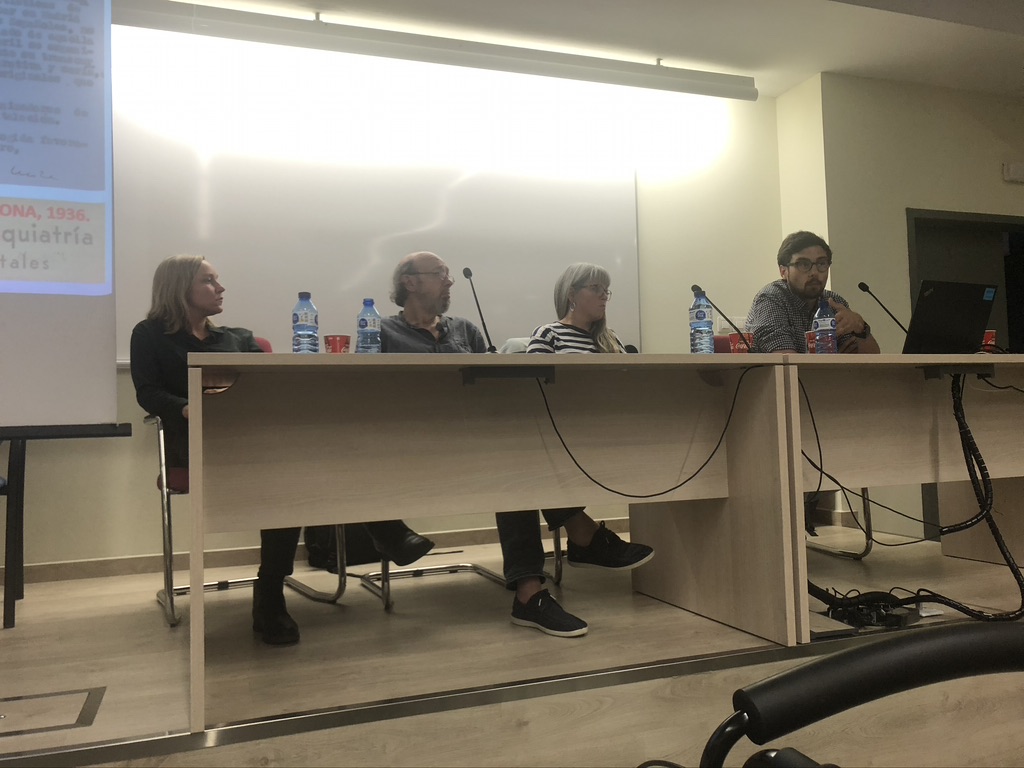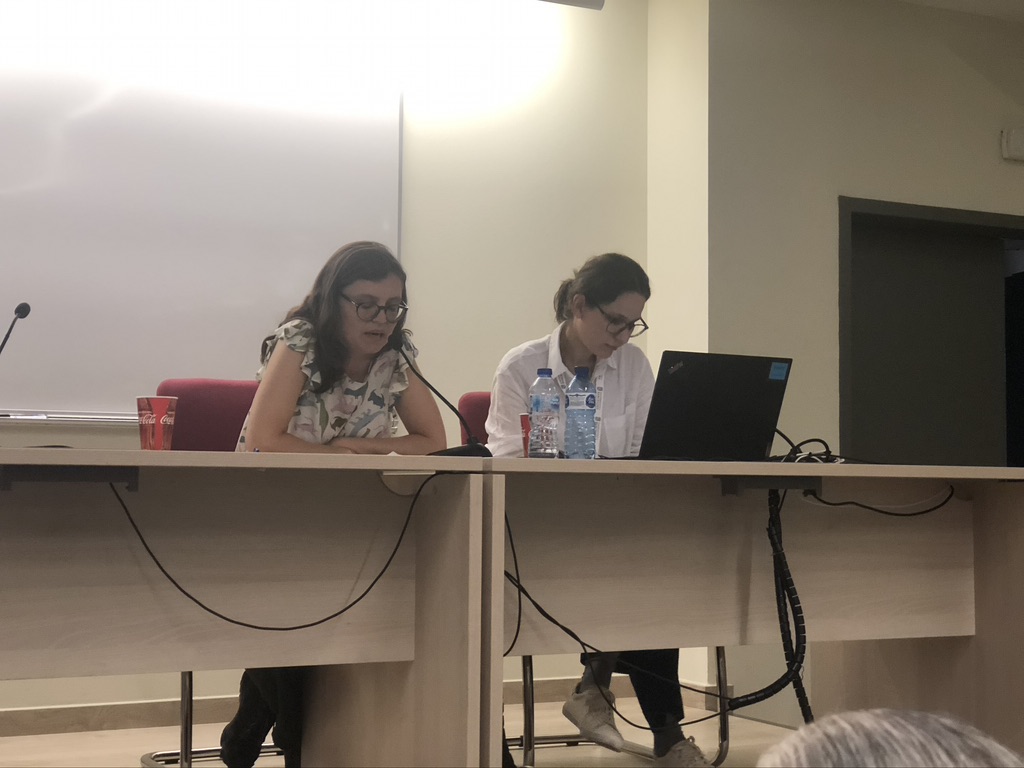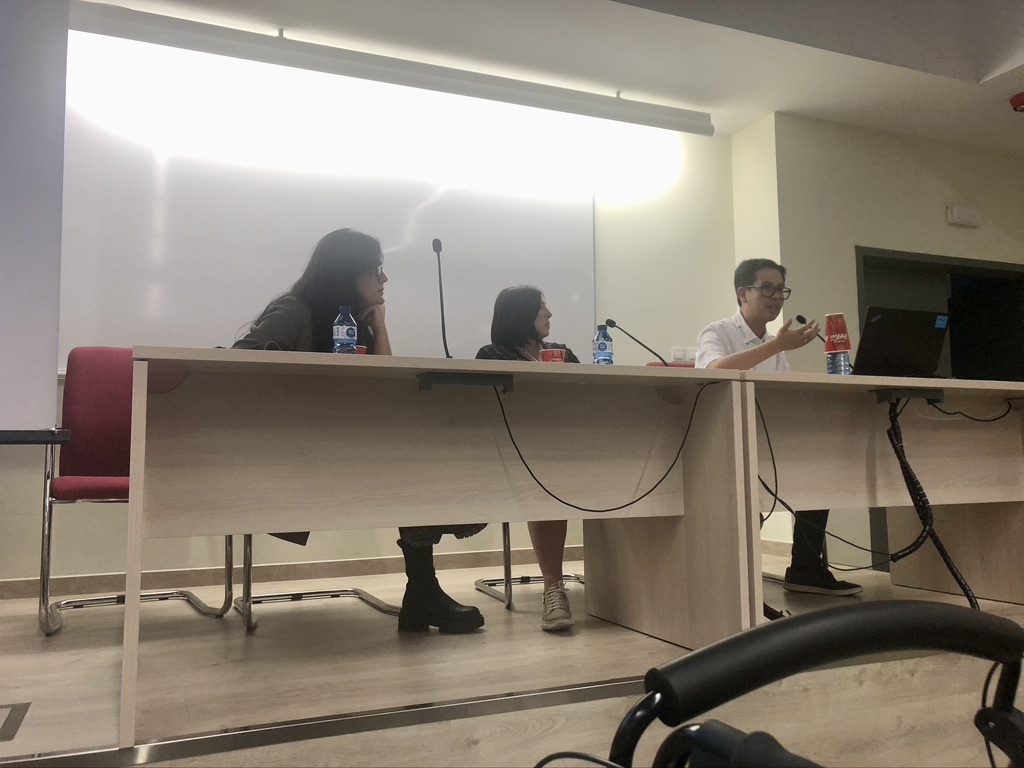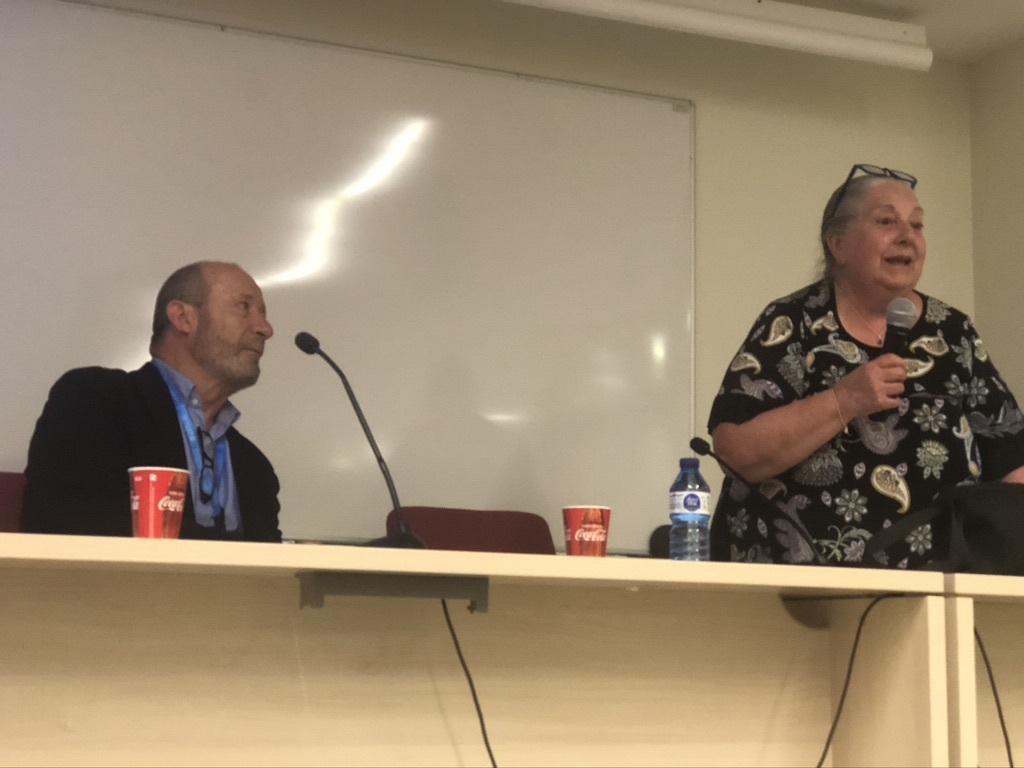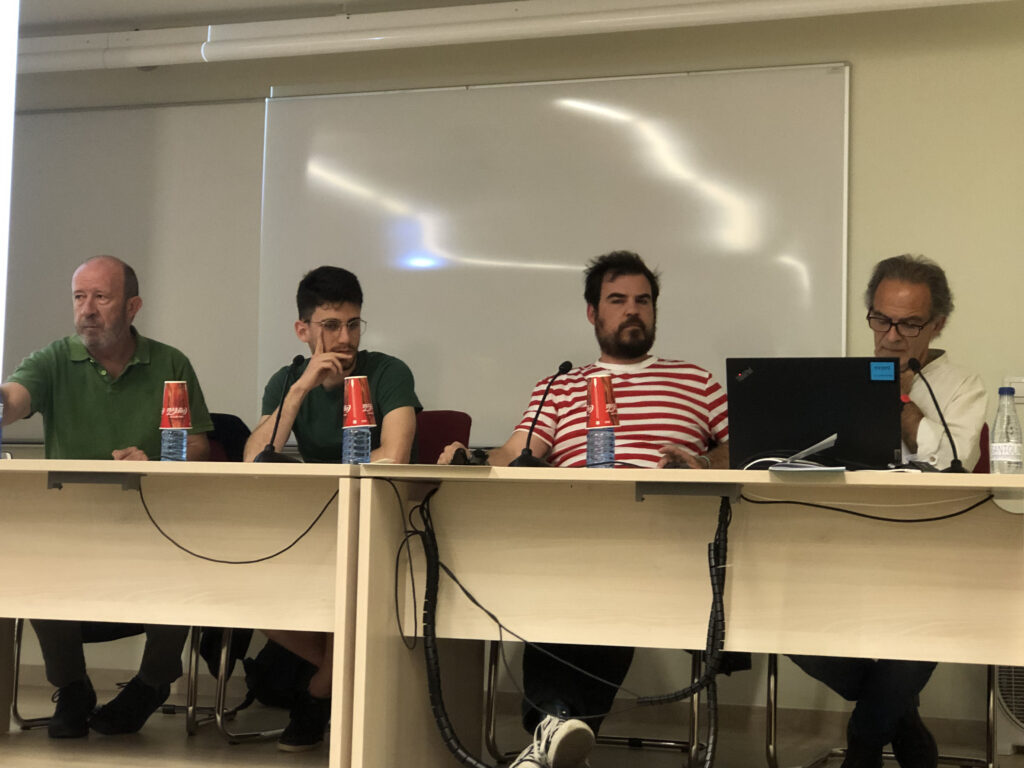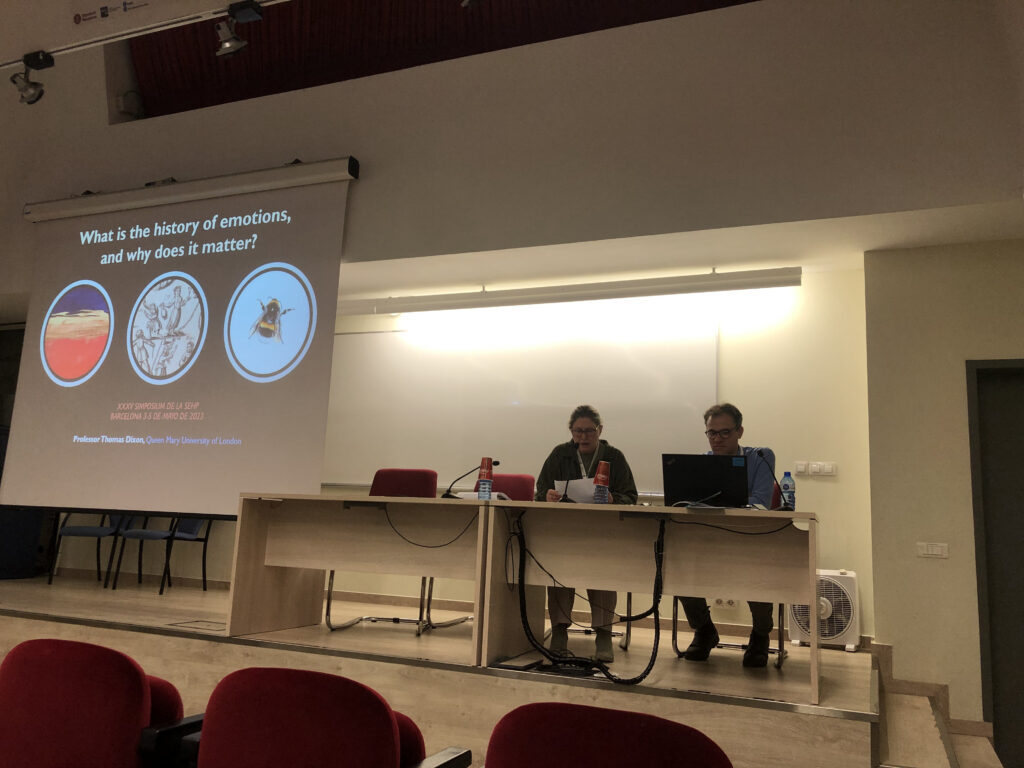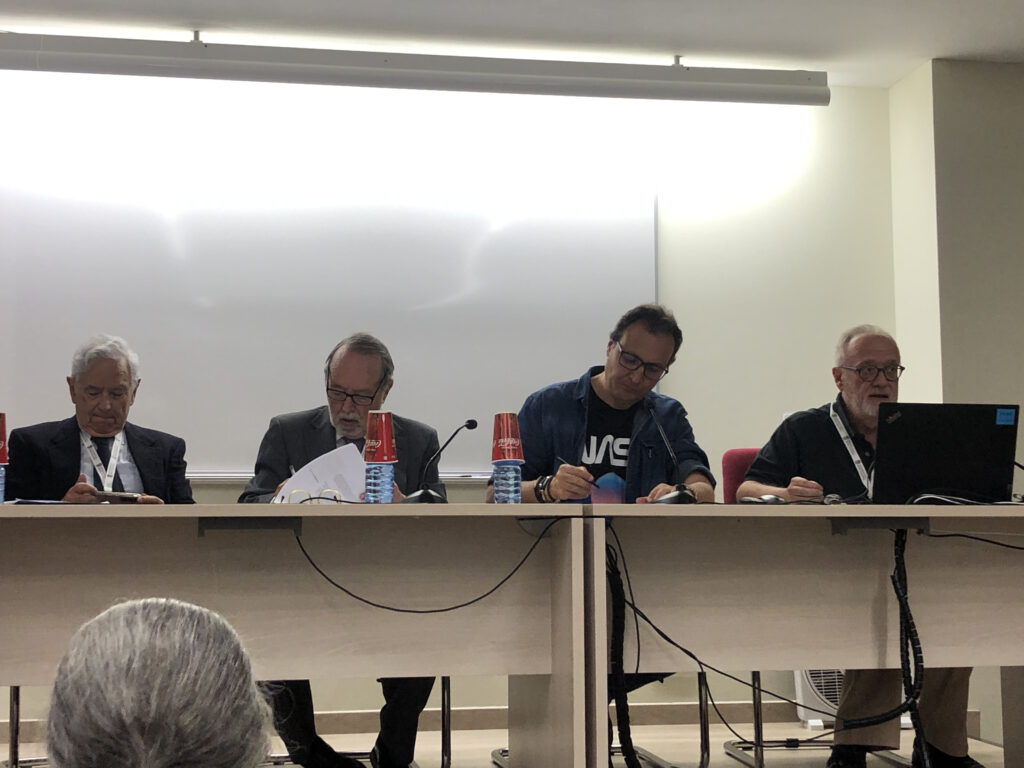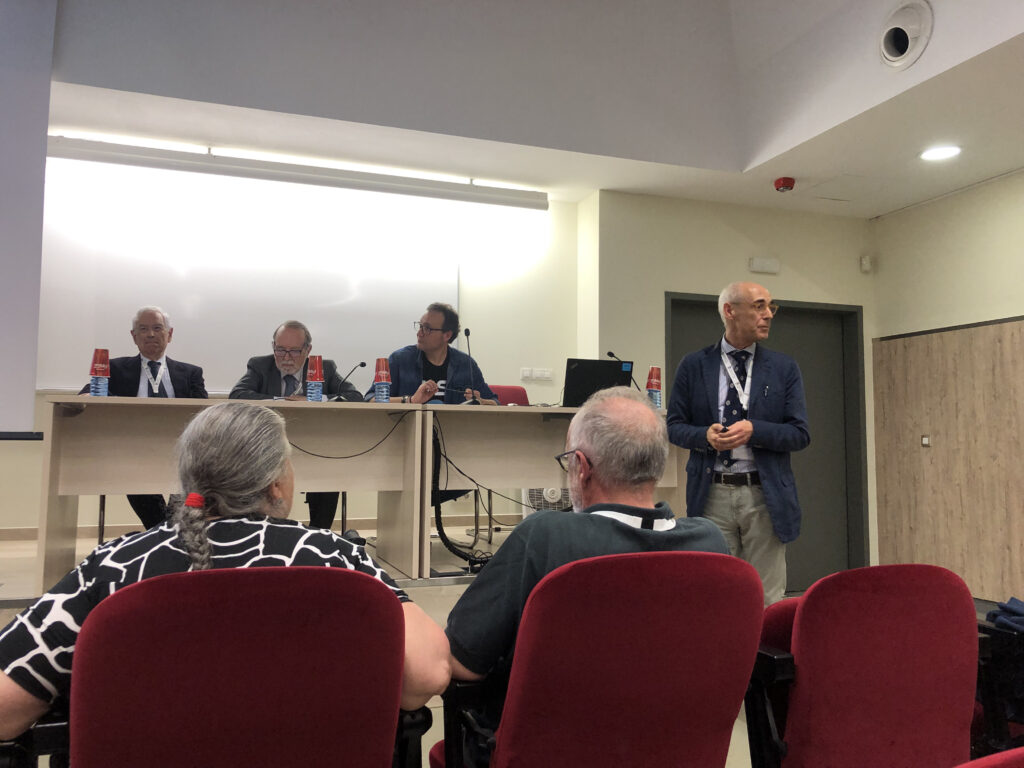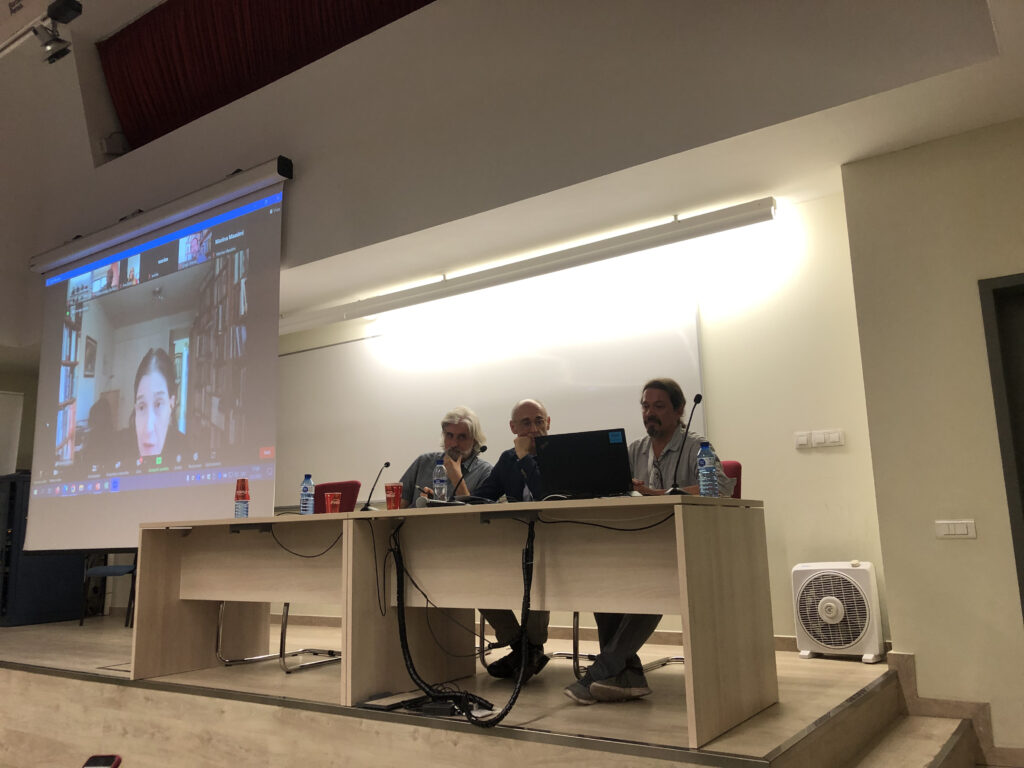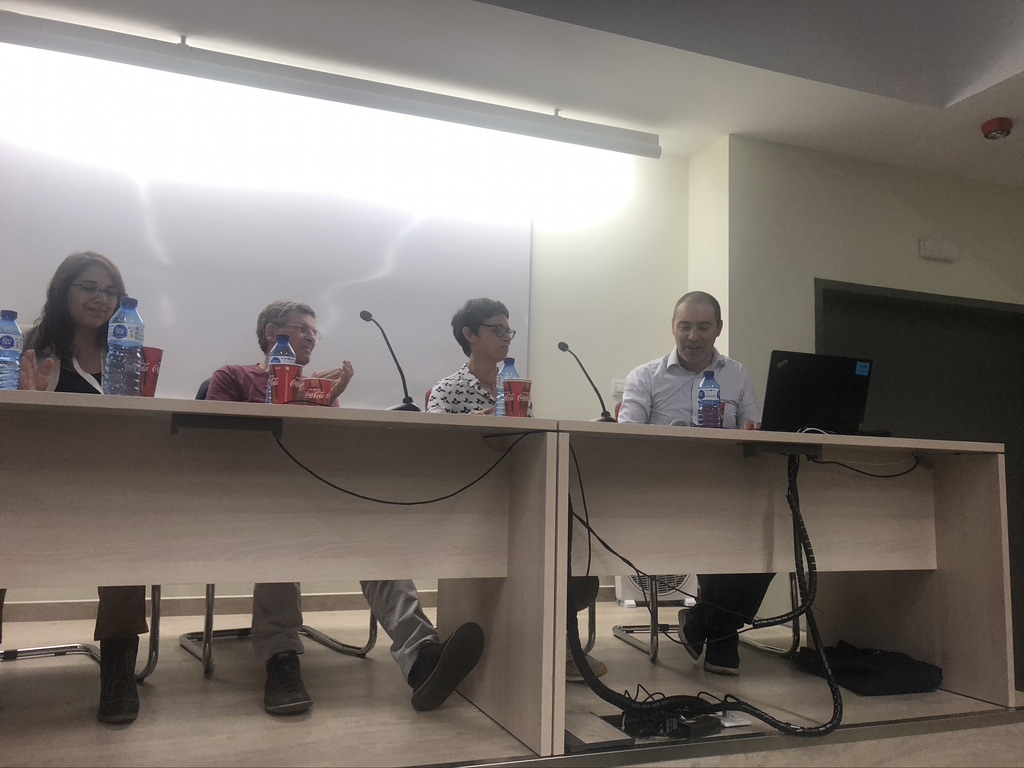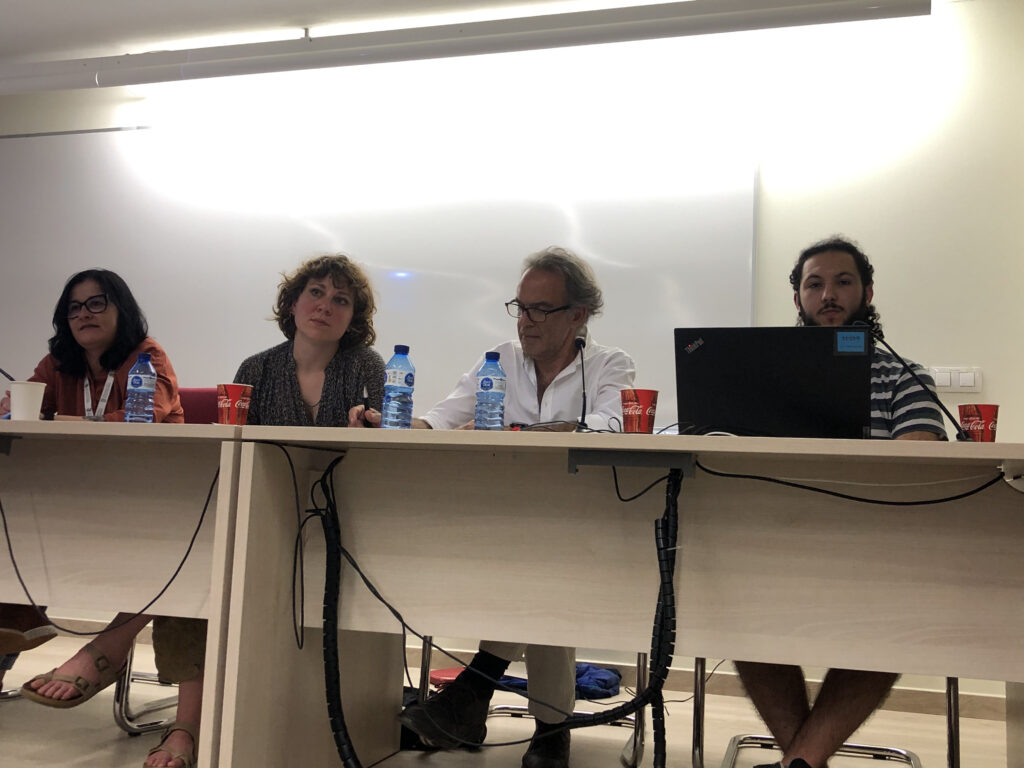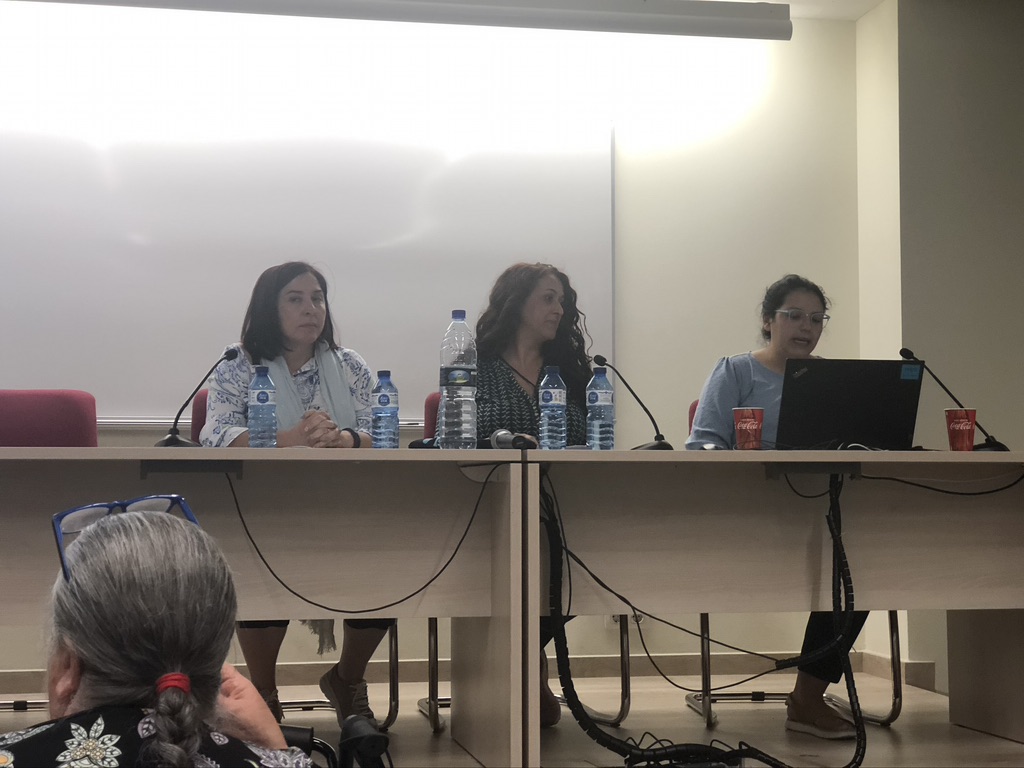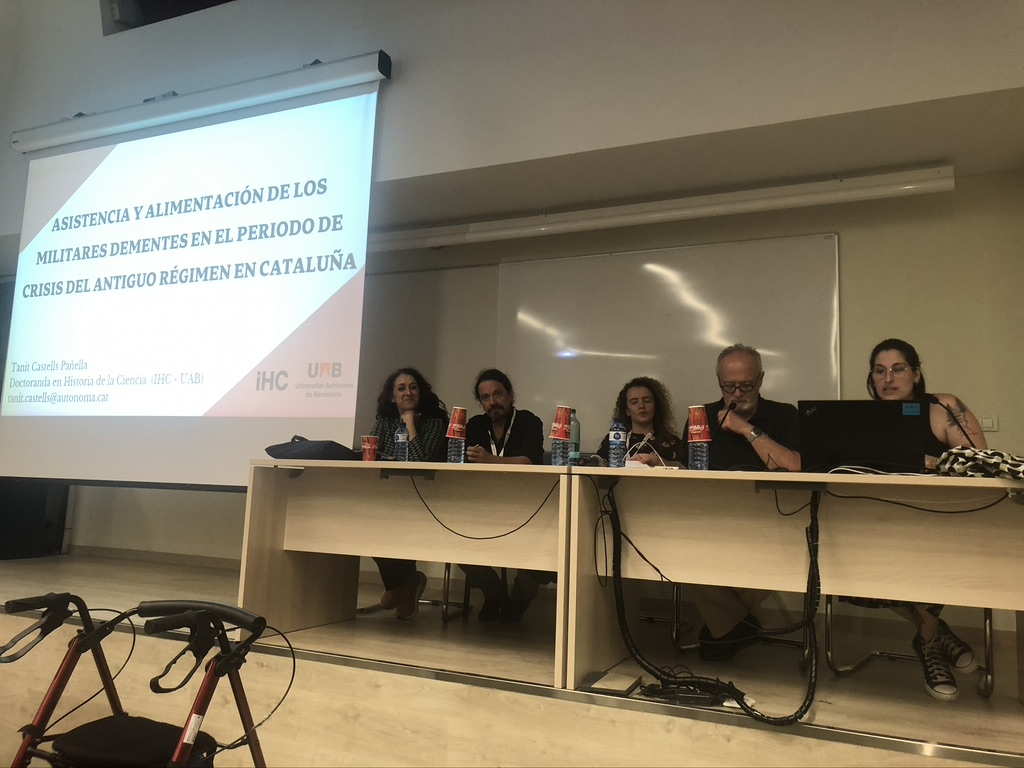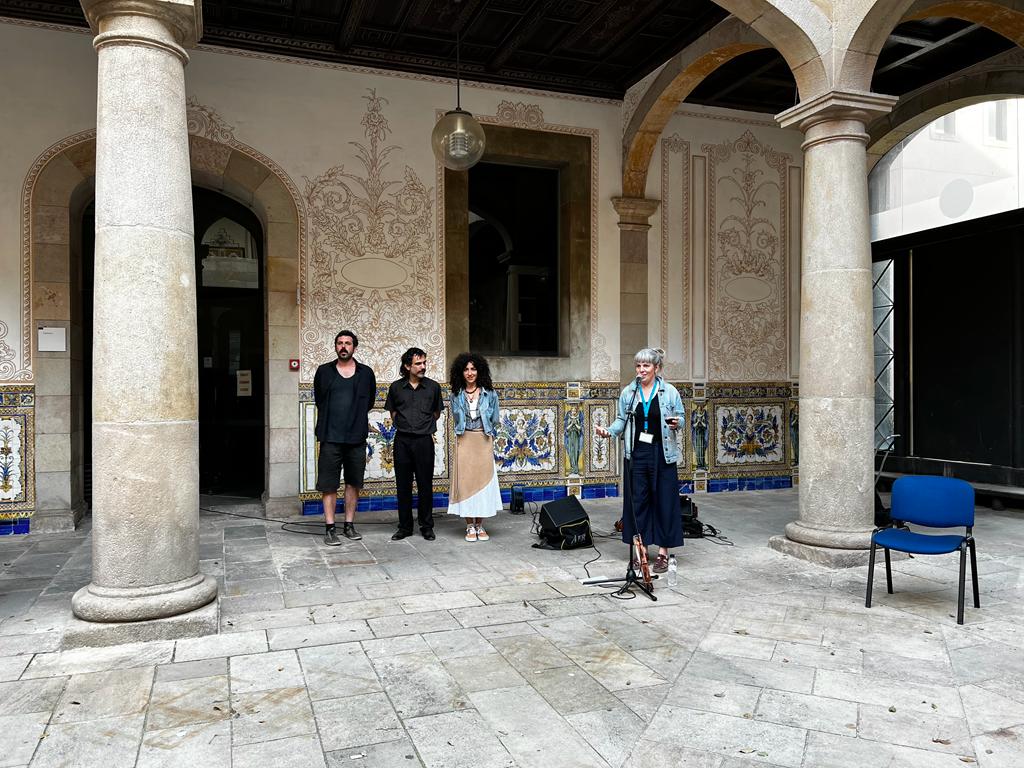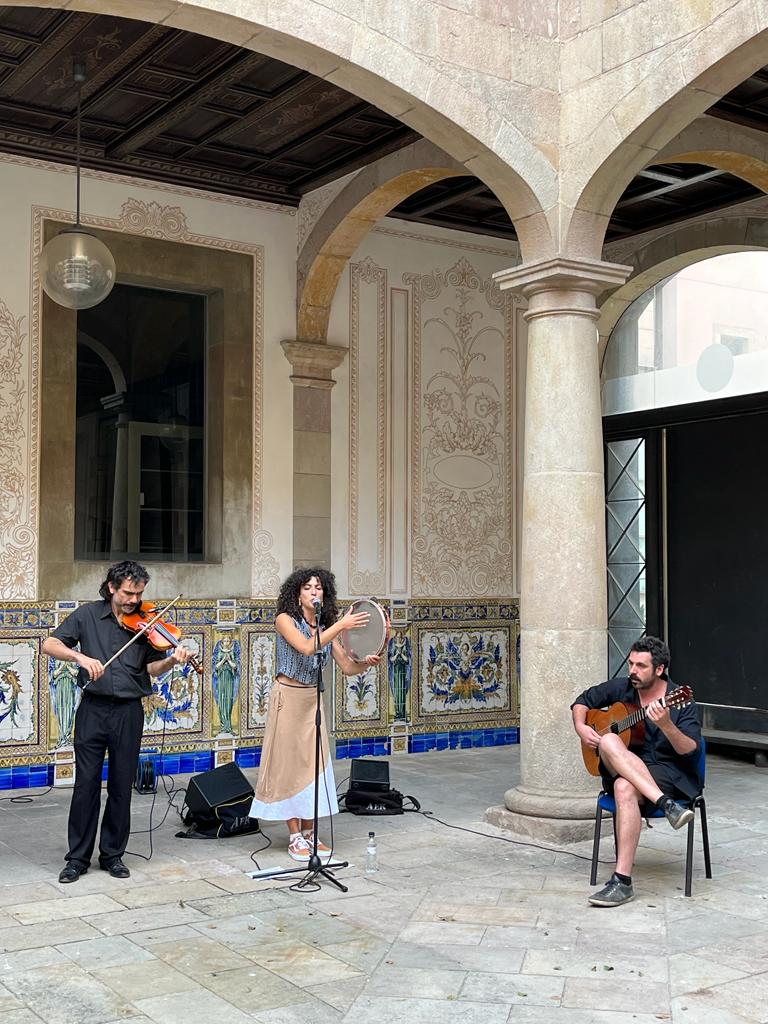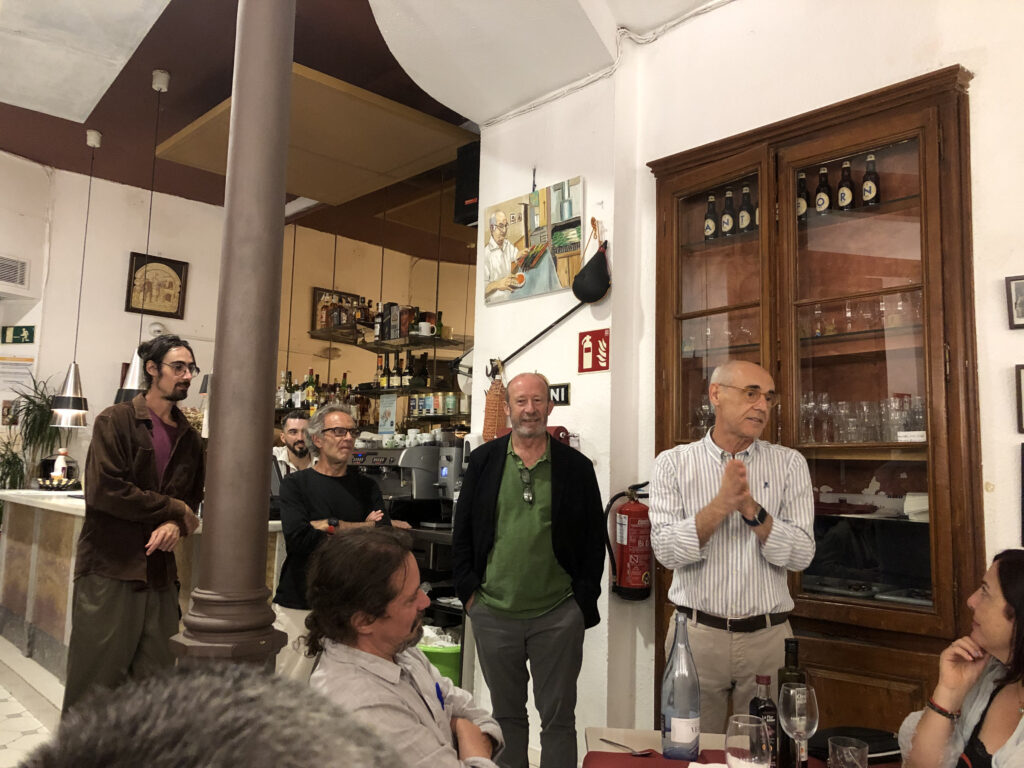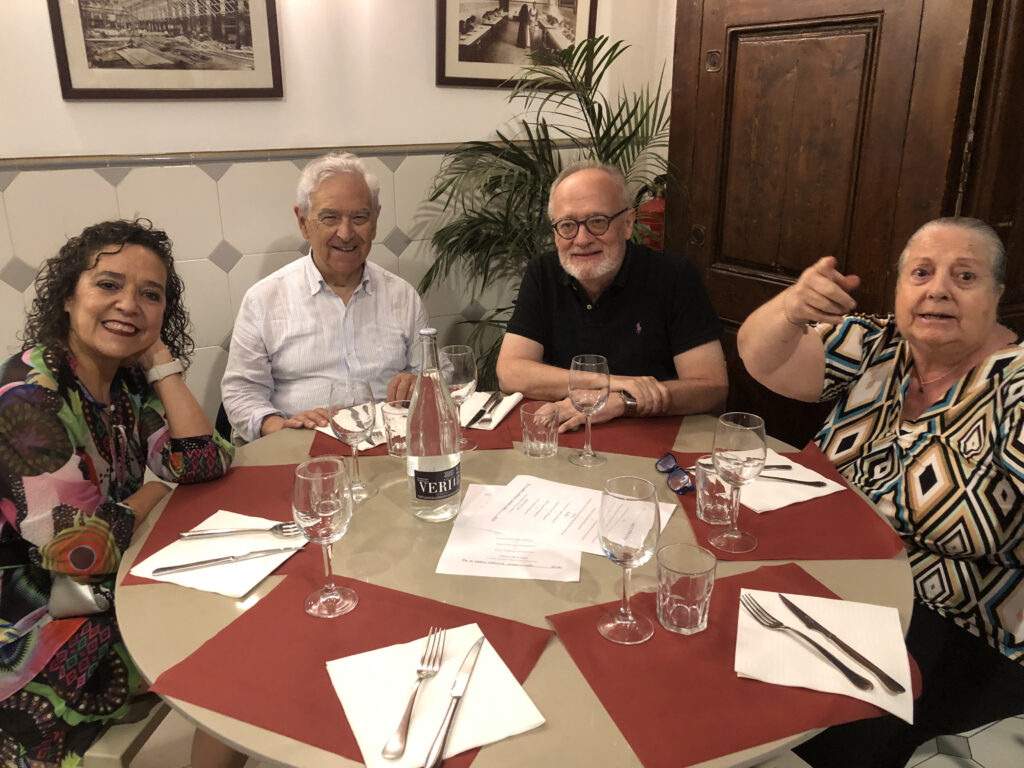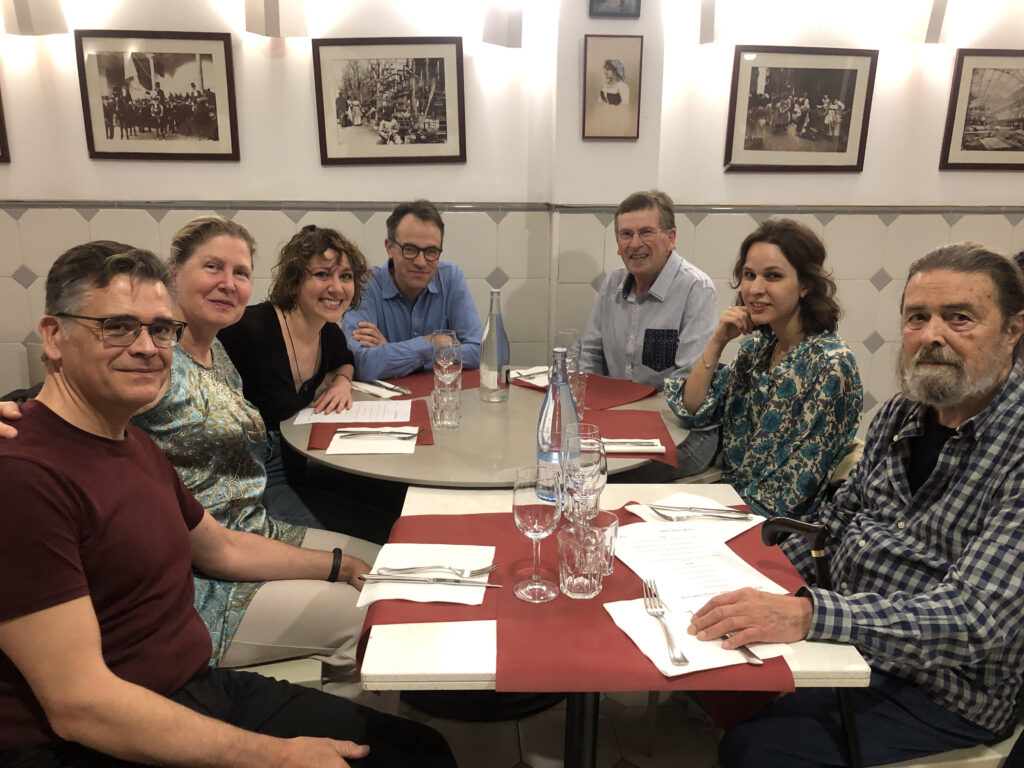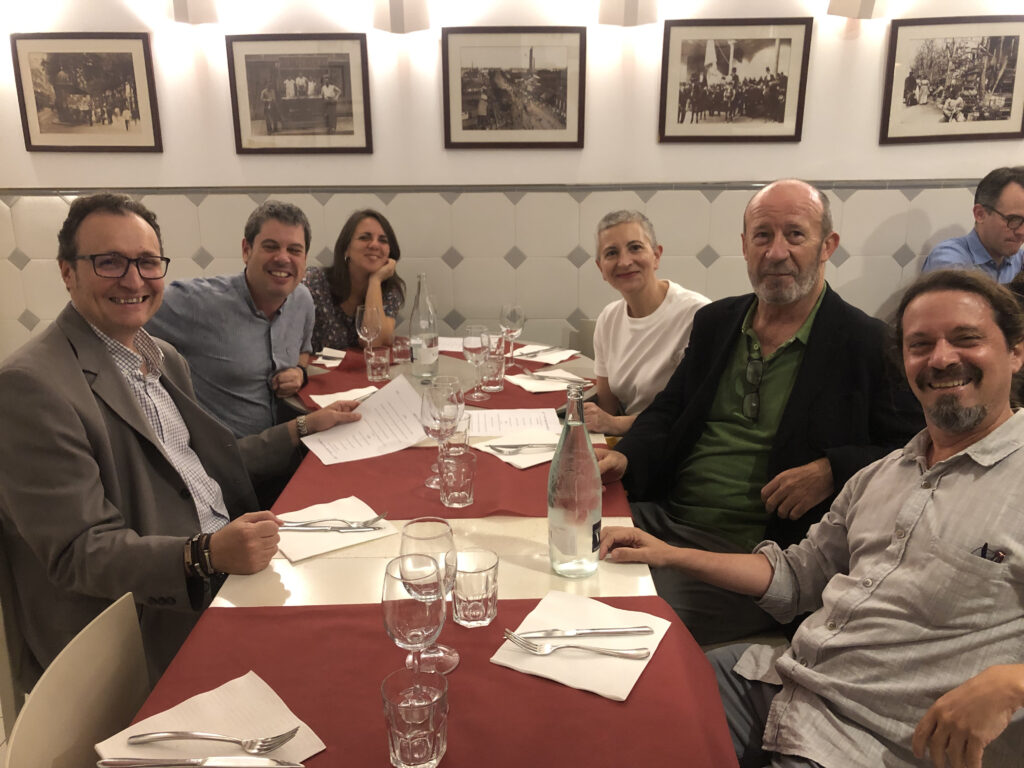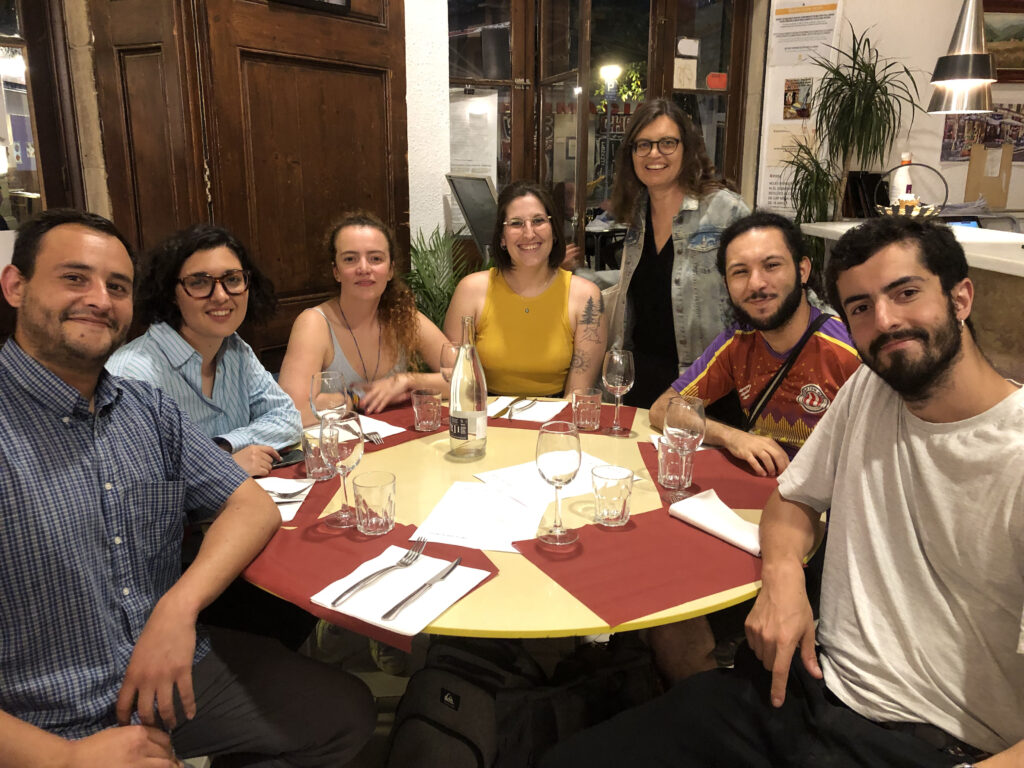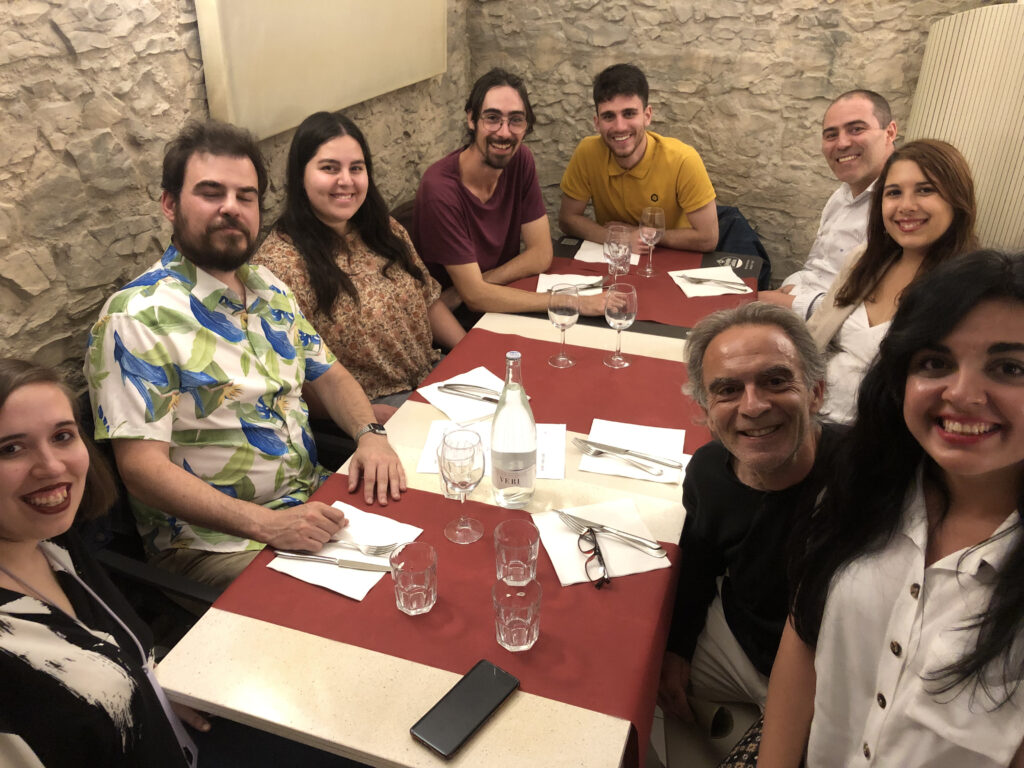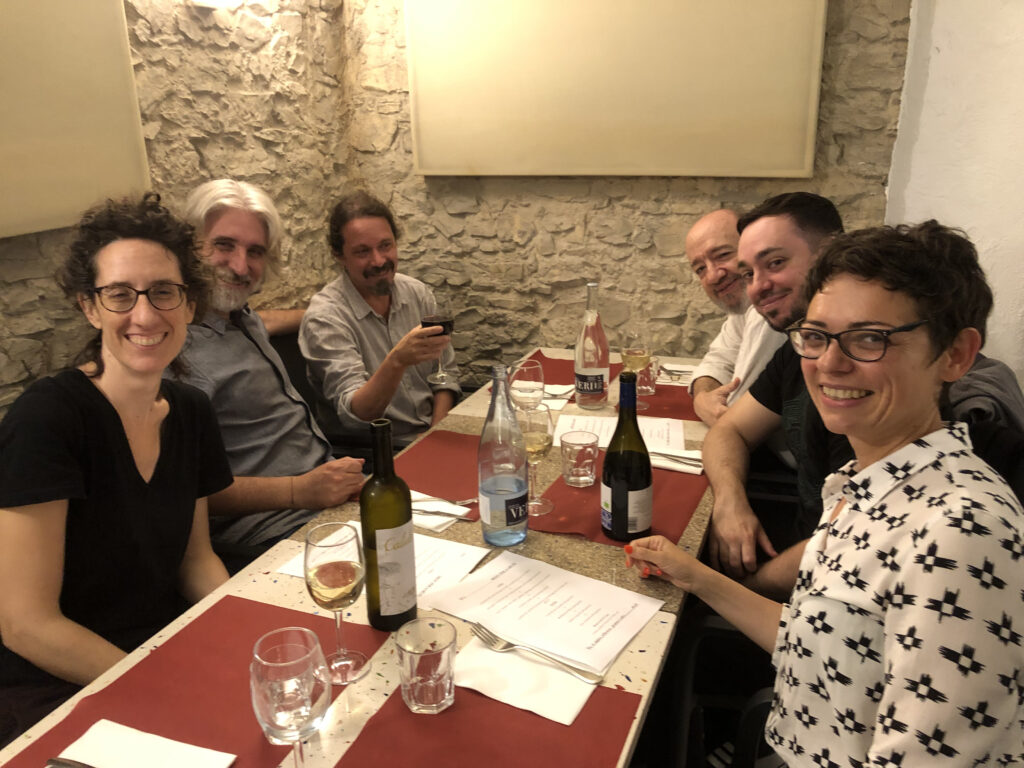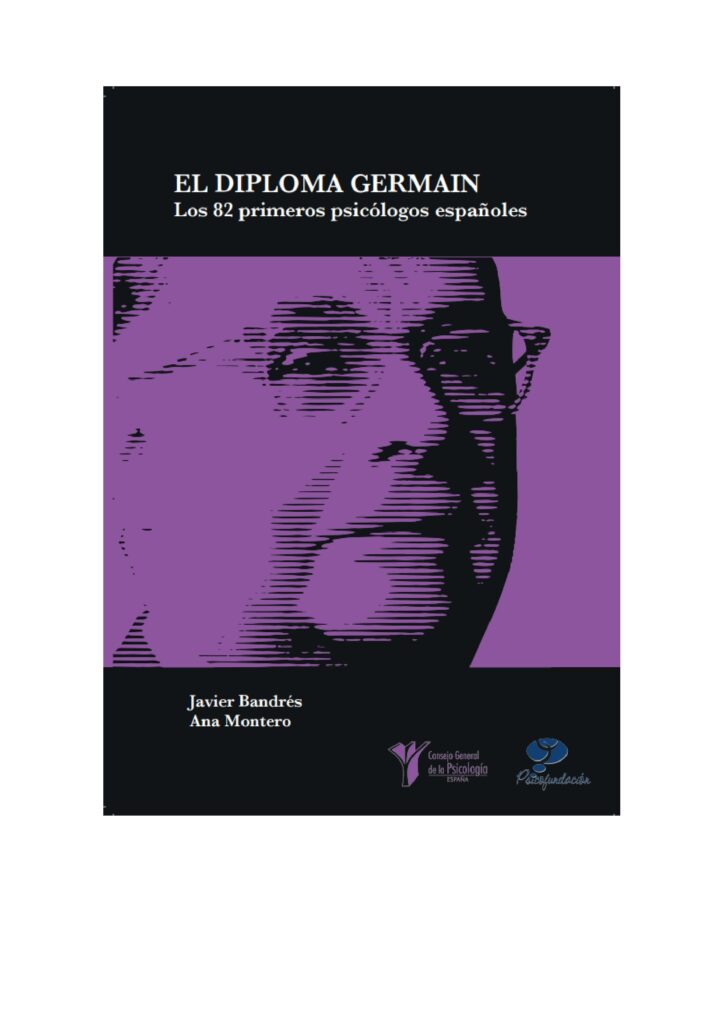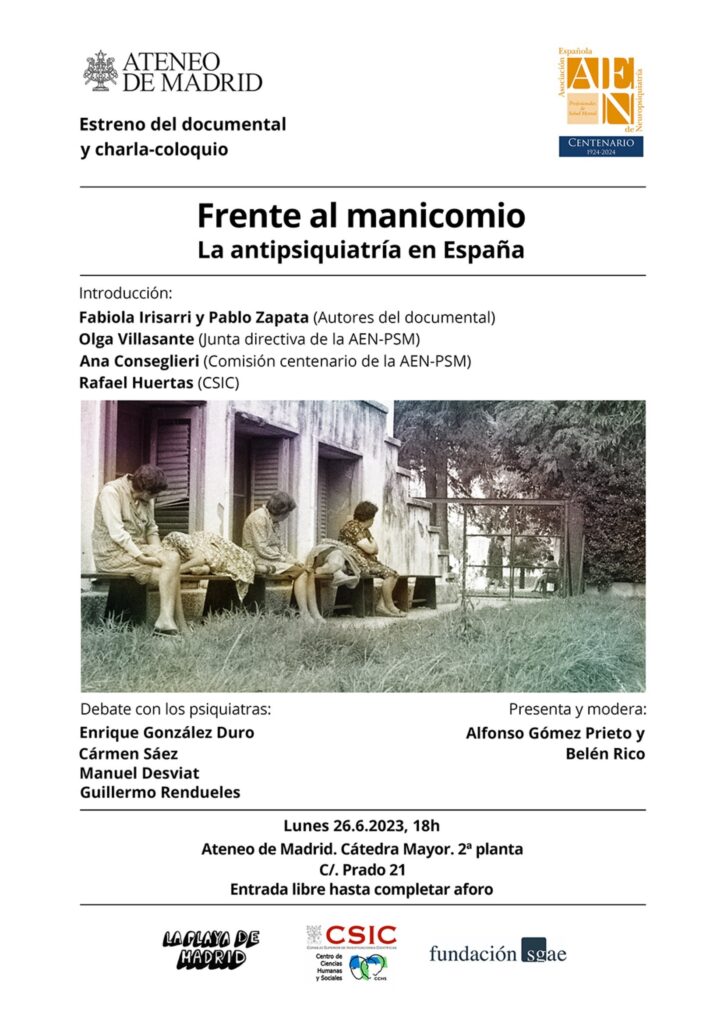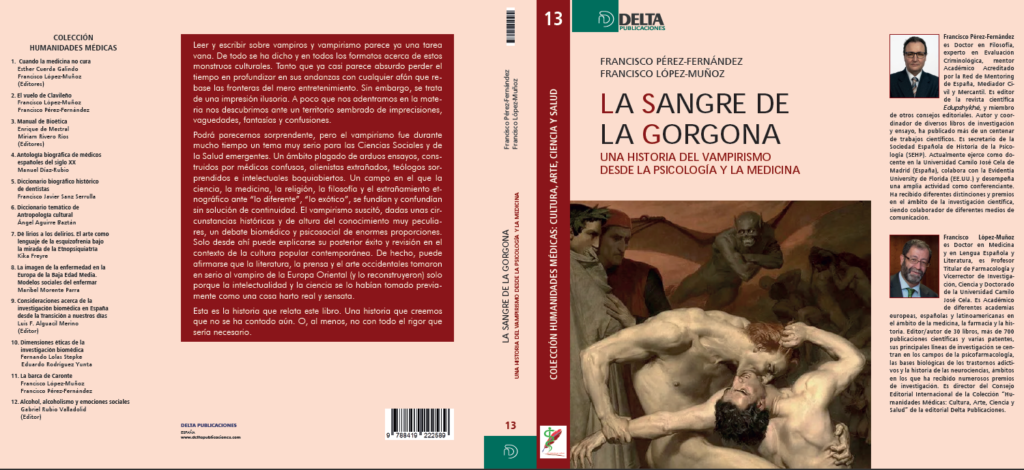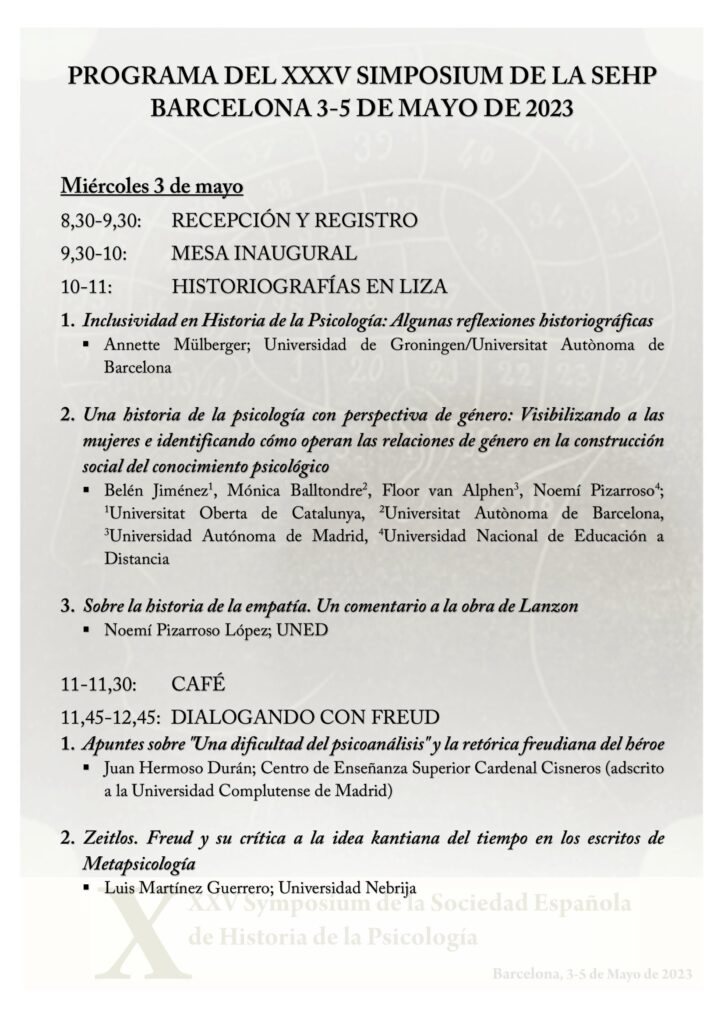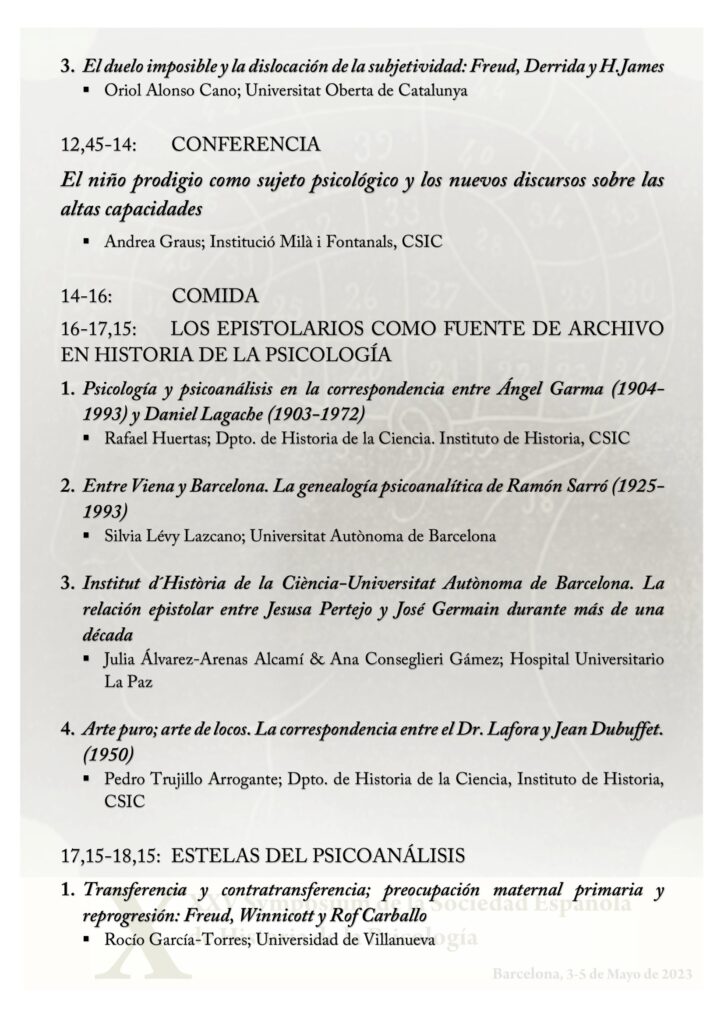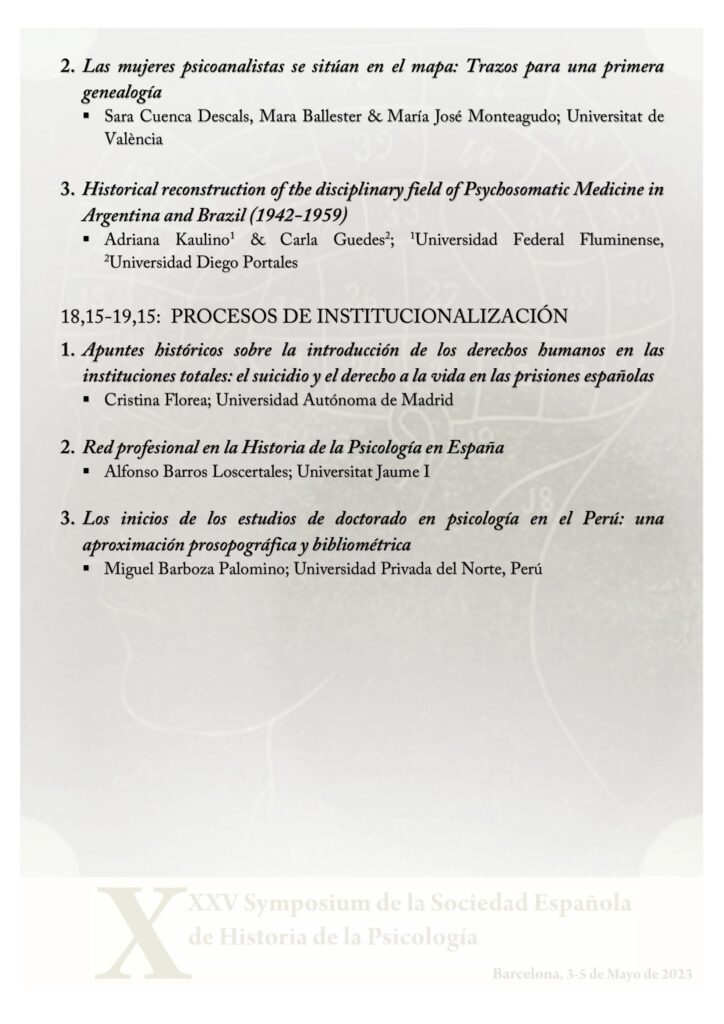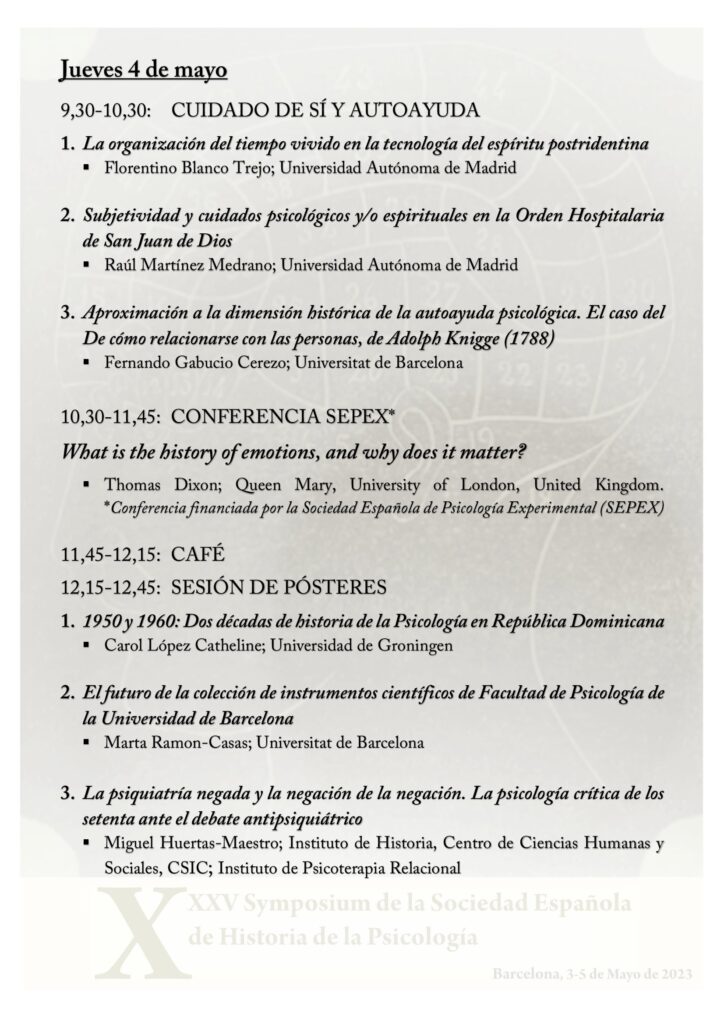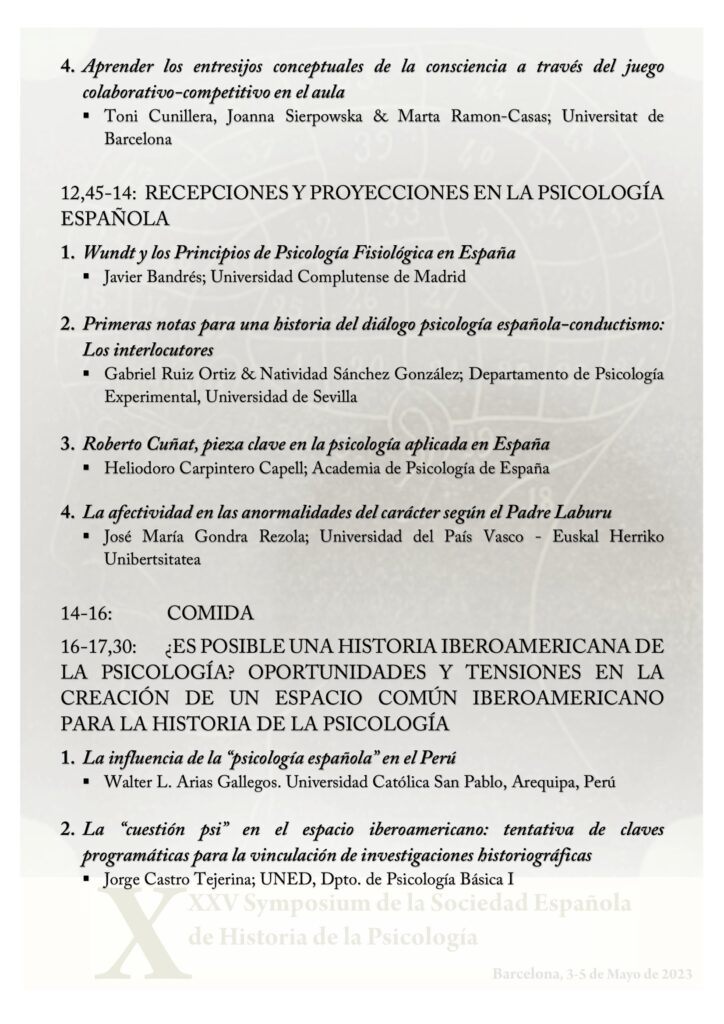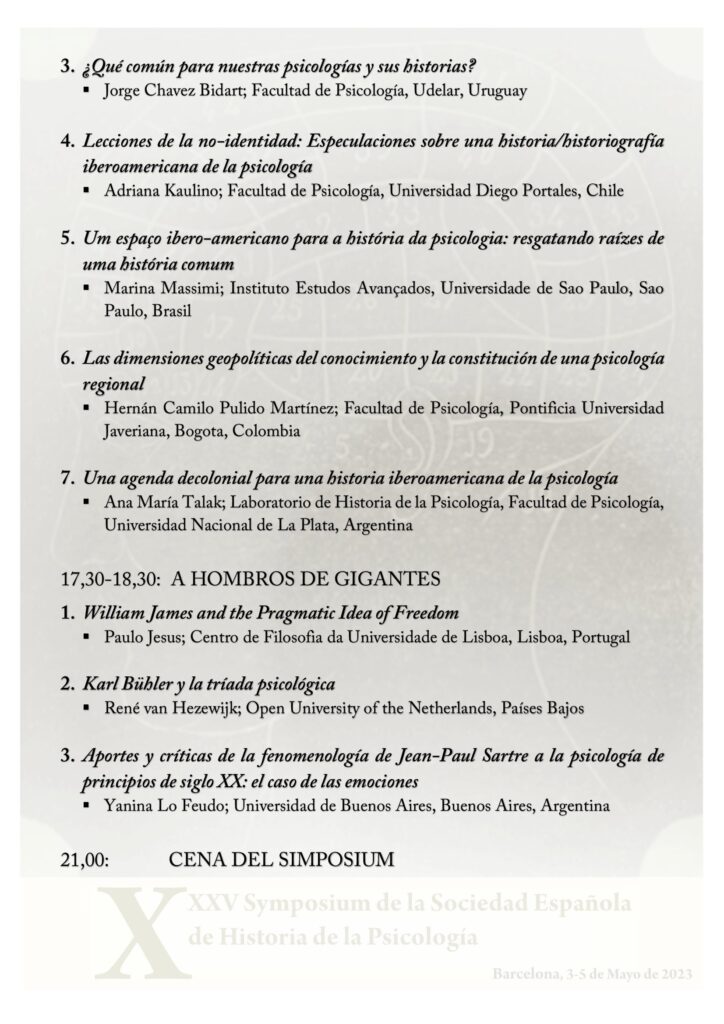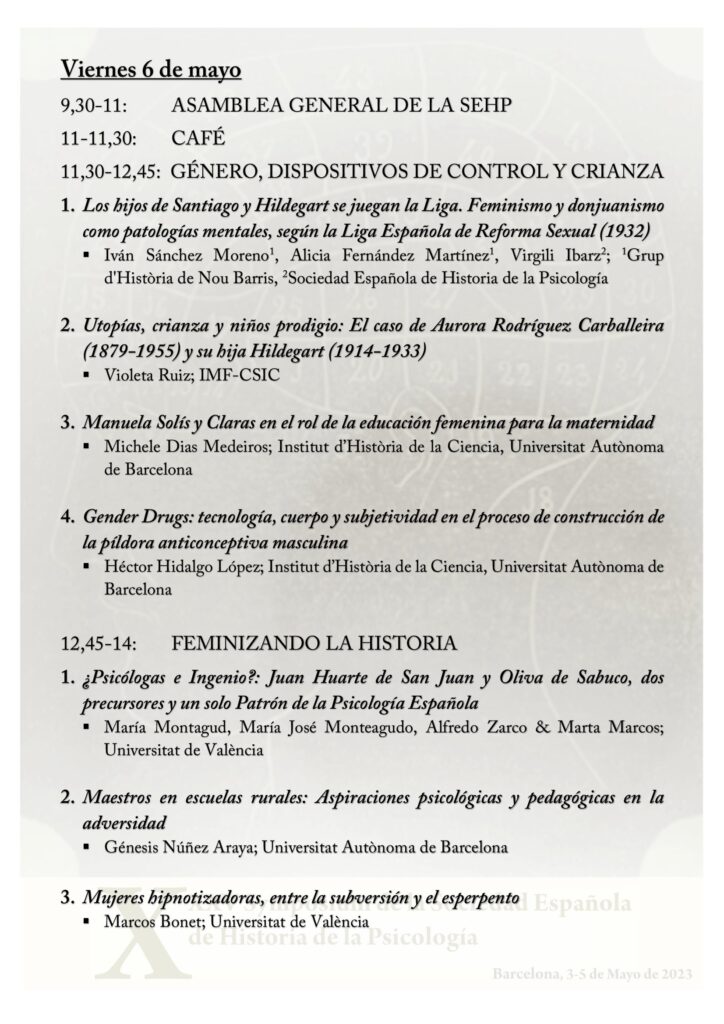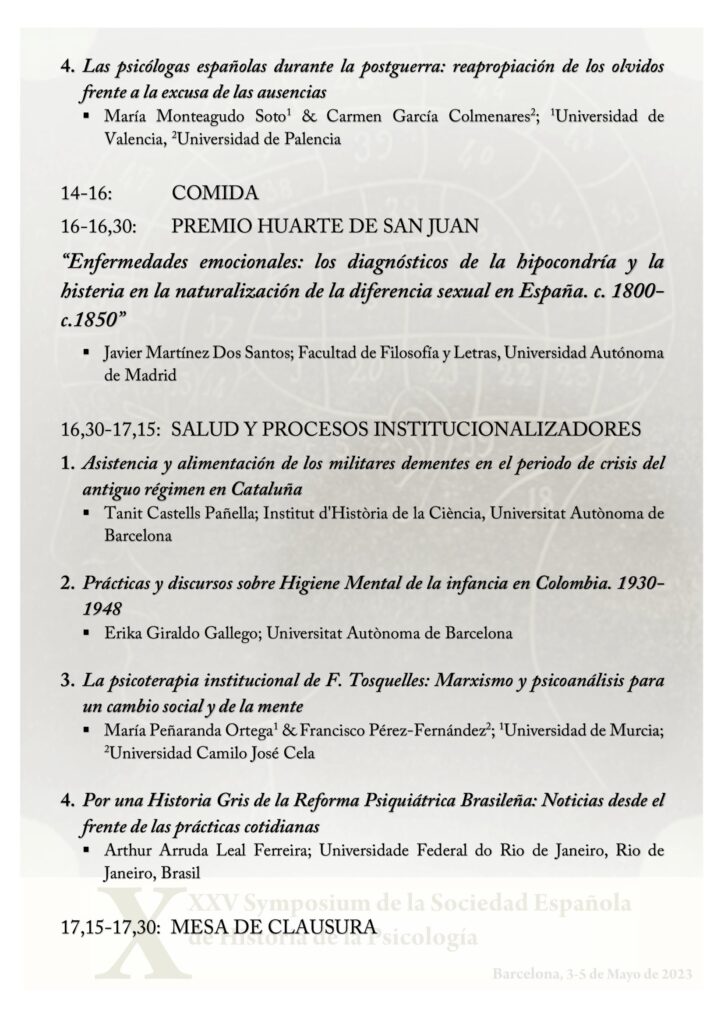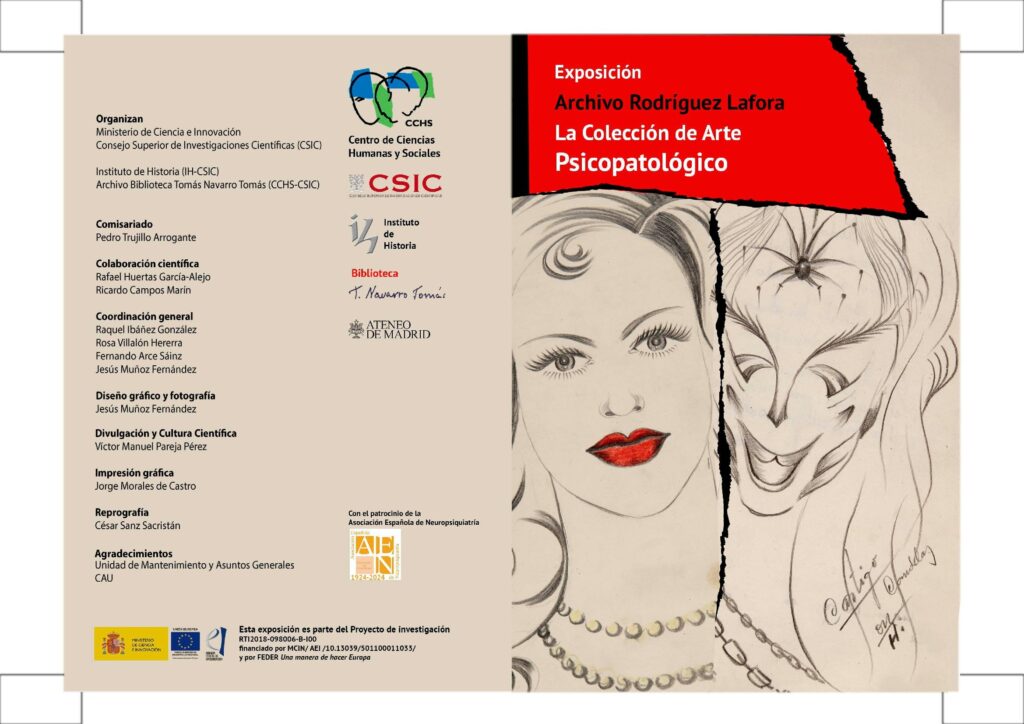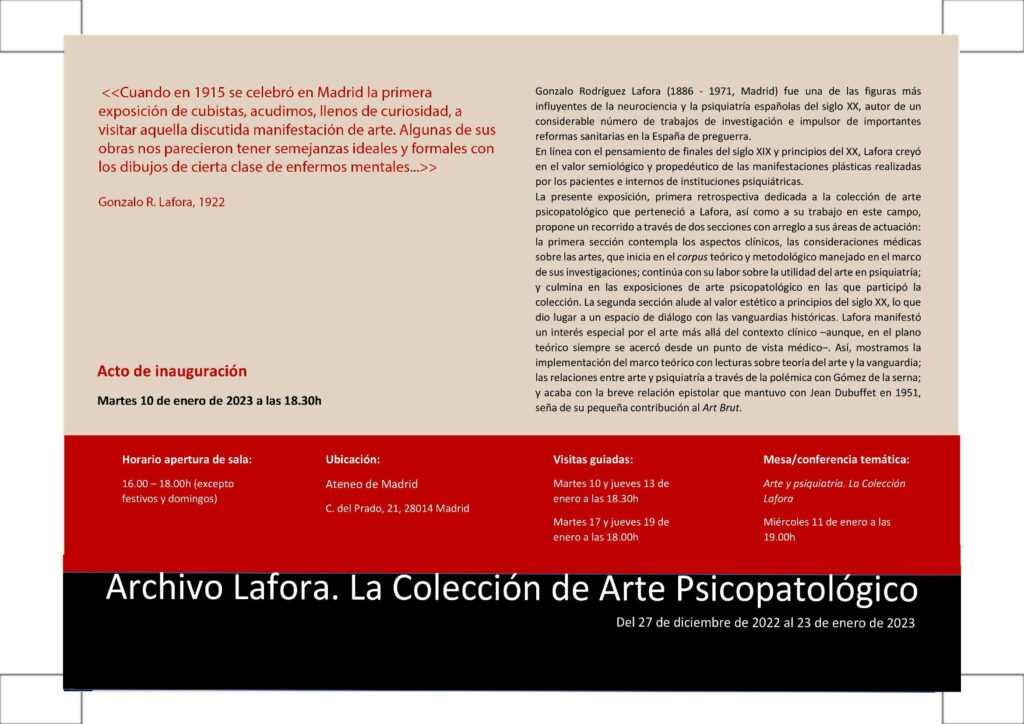CRÓNICA DEL XXXV SYMPOSIUM DE LA SOCIEDAD ESPAÑOLA DE HISTORIA DE LA PSICOLOGÍA
Barcelona, 3-5 de mayo de 2023.
Tanit Castells Pañella (Institut d´Història de la Ciencia, Universitat Autònoma de Barcelona)
Michele Dias Medeiros (Institut d´Història de la Ciencia, Universitat Autònoma de Barcelona)
Héctor Hidalgo López (Institut d´Història de la Ciencia, Universitat Autònoma de Barcelona)
Este año, celebrando su trigésimo quinto año, el simposio de la SEHP escogió como sede Barcelona. Aunque la sede se situó en la Facultad de Filosofía de la Universitat de Barcelona, debemos mencionar la hibridación de la Universitat de Barcelona, la Universitat Autònoma de Barcelona y la Universitat Oberta de Catalunya para la realización de esta nueva edición.
Como es de rigor, la bienvenida e inauguración fue a cargo del Excmo. Sr. Rector de la UB, Dr. Joan Guàrdia Olmos; la subdirectora de docencia de Estudis de Psicologia i Ciències de l’Educació de la UOC, Dra. Lourdes Guàrdia Ortiz; el director del Institut d’Història de la Ciència de la UAB, Dr. Agustí Nieto Galán; el presidente de la SEHP, Dr. Gabriel Ruiz, Ortiz; y el presidente del Comité Organizador del XXXV Symposium de la SEHP, Dr. Fernando Gabucio Cerezo.
La mesa de apertura, titulada Historiografías en Liza, inaugurada por Annette Mülberger, delimitó las líneas principales en torno a las que se desarrollaría el symposium. La Dr. Mülberger estructuró su ponencia en torno a la búsqueda de alternativas a lo que, a su parecer, constituye uno de los principales problemas de nuestra disciplina: la fragmentación y divergencias entre las distintas corrientes historiográficas de la misma. Bajo la búsqueda de la generación de una historia de la psicología más inclusiva, la cual conciliara y agrupase a las diferentes burbujas cuya existencia había mostrado previamente, la doctora apeló a la unidad mediante la incorporación de perspectivas desde abajo y a partir de nuevos contextos culturales. Recogiendo las ideas de esta ponencia, la segunda intervención –a cargo de Belén Jiménez, Mònica Balltondre, Floor van Alphen y Noemí Pizarroso– resaltó la necesidad de la aplicación de la perspectiva de género en la construcción social del conocimiento psicológico, a través del análisis de un caso tan ilustrativo como es el de la frenología. Para ello, frente a la metodología de la historia clásica, las ponentes consideraron la ciencia como una actividad social configurada por sus condiciones de posibilidad sociohistóricas y culturales, en la cual es preciso tener en cuenta la dimensión tanto tecnológica como práctica de esta. Finalmente, la mesa se cerró con la comunicación de Noemí Pizarroso, la cual analizaba la obra de Susan Lanzoni, Empathy: a history (2018). La Dr. Pizarroso destacó como Lanzoni trata el concepto de empatía, eludiendo una definición rígida y definitiva y descartando una historia lineal de la misma, para trabajar utilizando la ontología histórica de Ian Hacking y trazar los diferentes modos y contextos en los que operaba este término. Asimismo, alabó la labor de Lanzoni para visibilizar a protagonistas femeninas obviadas hasta ese momento. Sin embargo, también encontró una serie de limitaciones en la obra, como la ausencia casi total de otros ámbitos culturales aparte del norteamericano y la falta de una historia más enfocada en la cultura material y no tan estrictamente conceptual.
La segunda mesa, Dialogando con Freud, se articuló en base a cuatro ponencias. En la primera de ellas, Juan Hermoso expuso cómo la oposición en torno a la obra de Freud es utilizada por este como parte de su retórica heroica, así como cuál es el origen y quiénes son los referentes teóricos y las influencias biográficas y religiosas que le conducen a la formulación de este pensamiento. La segunda, presentada por Luis Martínez, abordó la crítica del padre del psicoanálisis a la idea kantiana del tiempo, examinando la transición del universal kantiano de tiempo al zeitlos que busca explorar dinámicas del inconsciente. En la tercera, Oriol Alonso Cano revisó la evolución de otro concepto de la obra de este pensador, al tensionar las primeras nociones del duelo freudiano con su desarrollo y apropiación por parte de Derrida –mediante el duelo imposible–, mediante la obra de Henry James. La última ponencia de la mesa, a cargo de Sara Cuenca Descals y Mara Ballester, reivindicó a las figuras femeninas que contribuyeron al desarrollo y la popularización del psicoanálisis en el siglo XX, con el objetivo de poder analizar la mirada femenina de estas mujeres en la producción del conocimiento psicoanalítico del momento, en artículos posteriores al presentado.
La conferencia principal del primer día, El niño prodigio como sujeto psicológico y los nuevos discursos sobre las altas capacidades, quedó a cargo de Andrea Graus. Esta analizó en su exposición casos de niños prodigio, problematizando la percepción del talento infantil en la Europa moderna de cambio del siglo XIX al XX. Construyó así una historia de los niños prodigio que no es ni biográfica ni disciplinar, sino que problematiza dicha figura como construcción social, cultural y objeto científico desde las propias vivencias de los niños. Buscó por tanto llevar a cabo una historia encarnada de estos infantes, analizando el tránsito de una perspectiva patologizante de la precocidad a la producción científica de una noción de genialidad estrechamente ligada a discursos eugenésicos. Por último, estudió cómo este sujeto está siendo reapropiado en las narrativas sobre altas capacidades, a partir de discursos en torno al potencial y la creatividad.
Tras una pausa para comer, se presentó la mesa Los epistolarios como fuente de archivo en historia de la psicología conjunta entre Rafael Huertas, Silvia Levy, Julia Álvarez-Arenas y Ana Conseglieri, y Pedro Trujillo. Aunque cada ponencia tenía objetos de estudio distintos, las cuatro fueron proyectadas hacia el uso metodológico de los epistolarios como fuentes para la generación de conocimiento científico. Mostraron cómo el diálogo entre la correspondencia y las fuentes oficiales o más específicamente científicas, permiten aportar nuevas perspectivas de estudio en primera persona y desde abajo. Rafael Huertas centró su ponencia en la correspondencia entre Ángel Garma y Daniel Lagache, dos figuras clave de la psicología y el psicoanálisis del siglo XX. Gracias al estudio de su correspondencia el Dr. Huertas pudo observar cómo se desarrolló su colaboración. Es decir, el análisis de las fuentes externas al ámbito estrictamente académico permitió rastrear las influencias o las ideas que circularon en su contexto. A continuación, Silvia Levy, a través del análisis de la correspondencia del psiquiatra catalán Ramón Sarró, expuso los elementos con los cuales dicho científico construyó su propia imagen y legitimó su postura y renombre científico. Julia Álvarez-Arenas y Ana Conseglieri, siguiendo con la temática epistolar, presentaron el análisis de la correspondencia entre Jesusa Pertejo y José Germain, reafirmando el uso de fuentes epistolares como imprescindibles para observar la circulación de conocimiento y entender la articulación de la vida profesional y científica de dichos actores históricos. Finalmente, abriendo una nueva perspectiva a través de la historia del arte, Pedro Trujillo analizó cómo la relación epistolar entre el neuropsiquiatra madrileño Gonzalo Rodríguez Lafora y el artista francés Jean Dubuffet, contribuyó en el desarrollo de los principios teóricos del Art Brut en sus primeros años (1948).
En la última mesa del día, titulada Procesos de Institucionalización, Cristina Florea presentó qué papel tuvo la psicología como herramienta de intervención –con sus aplicaciones y limitaciones– en la concepción de los suicidios en las prisiones españolas. A continuación, Miguel Barboza expuso una aproximación bibliométrica de los estudios de doctorado en psicología en Perú, realizados desde los años ‘90 hasta la nueva ley de universidades de 2014. El día concluyó con el homenaje audiovisual a cargo de la Dra. Dolors Saiz Roca a la Dra. Milagros Saiz Roca, investigadora y pieza fundamental en el desarrollo de la SEHP.
El segundo día se inauguró con la mesa titulada Cuidado de sí y Autoayuda, con la primera presentación por Florentino Blanco, el cual habló sobre la organización del tiempo vivido en la tecnología del espíritu postridentina. Problematizó así esta tecnología católica del espíritu de organización del tiempo como un dispositivo de control, que junto a otros –como la confesión y la oratoria sagrada– constituye una tecnología del tiempo vivido y de la vida cotidiana, en la que la organización del tiempo –en su momento y hasta el presente– se convierte y se naturaliza como una economía, que organiza y regula la relación del sujeto consigo mismo. La segunda ponencia del día quedó a cargo de Raúl Martínez, que destacó el ideario de la Orden Hospitalaria de San Juan de Dios en los cuidados psicológicos y/o espirituales a los enfermos “locos” y como se daba la formación de los cuidadores a través de técnicas subjetivas de cuidados de sí mismo, con el objetivo de convertirlos en cuidadores dóciles. De esta manera. se les despertaba una vocación de hospitalidad, la cual buscaba preservar la dignidad del enfermo. La tercera presentación de la mesa quedó a cargo de Fernando Gabucio, el cual trató la dimensión histórica de la autoayuda psicológica a través del análisis del libro De cómo relacionarse con las personas, de Adolph Knigge (1788), enfocándose en el tono prescriptivo y de consejos para unas buenas relaciones en la vida social que adopta la obra. El ponente cuestionó, intentando no caer en el presentismo, si esta filosofía práctica o ética social, característica del libro, podría de alguna manera relacionarse con la literatura moderna que se denomina de autocuidado. El debate posterior al desarrollo de esta mesa resultó muy productivo, al cuestionarse el sentido de estas maneras de hacer historia con respecto a formas de enfoque más objetivista o descriptivo y menos genealógico. Los ponentes, a su vez, retomaron el tema de la fragmentación entre escuelas de la historia de la psicología para abogar por una división no exclusivamente formal, sino también moral y política, en la cual consideraban que era de vital importancia realizar una aproximación situada y reflexiva respecto al campo de estudio escogido en cada análisis histórico.
La conferencia What is the history of emotions, and why does it matter?, de Thomas Dixon, director fundador del Centro Queen Mary para la Historia de las Emociones cerró la primera parte de las presentaciones de la mañana exponiendo tanto algunas características de la historia de las emociones y su desarrollo como disciplina y campo de investigación como su campo de estudio más específico, en el cual realiza una genealogía de las categorías “pasiones” y “emociones”, y como el estudio de las emociones y los hallazgos de los historiadores de las emociones pueden contribuir a otras ramas del conocimiento. El ponente también presentó su trabajo actual en escuelas primarias sobre los lenguajes emocionales, visuales y verbales utilizados por los niños. Desde su mirada, antimedicalista y despatologizante, este professor busca trasladar sus conocimientos académicos a las prácticas educativas. Con este fin de acercar a los infantes a sus emociones, aboga por tratar la gestión emocional como una forma de desarrollo personal y no centrarse en los mecanismos emocionales ligados al control.
Después del desayuno, tuvo lugar la Sesión de Pósteres, en la cual estuvieron expuestos los trabajos de cinco autores en dicho formato. Los temas de los pósteres eran muy diversos: el estudio de Carol López analizó los evento relevantes para la psicología que acontecieron entre 1950 y 1960 en República Dominicana, con el fin de trazar los inicios del proceso de institucionalización de esta disciplina en el país; Marta Ramon-Casas buscó resaltar la importancia patrimonial de la colección de instrumentos científicos de la Universidad de Barcelona y dar a conocer dicha colección; Miguel Huertas-Maestro exploró el abordaje que la revista Clínica y Análisis Grupal hacía de las críticas a las disciplinas psi y a la antipsiquiatría, desde un enfoque psicoanalítico de tradición marxista; Toni Cudillera et al. pretendió exponer los beneficios de la implementación de la metodología de Gamificación en la enseñanza de Historia de la Psicología, principalmente aplicada al estudio de los enfoques conceptuales de análisis de la consciencia humana; por último, Alfonso Barroso tuvo como objetivo trazar una red profesional de la historia de la psicología en España a partir de la identificación de sus profesionales y las relaciones laborales entre los mismos.
A continuación, siguió la mesa titulada Recepciones y proyecciones en la psicología española, donde el Dr. Javier Bandrés, siguiendo con el Dr. Gabriel Ruiz y la Dra. Natividad Sánchez, posteriormente el Dr. Heliodoro Carpintero, y finalmente el Dr. José María Gondra mostraron y explicaron los actores históricos y científicos que introdujeron y dialogaron con los discursos y prácticas que definieron la construcción de la psicología española desde finales del siglo XIX hasta el posfranquismo.
La primera mesa del jueves por la tarde brindó la oportunidad para trabajar en la creación de un proyecto común: el diseño de una historia iberoamericana de la psicología y la colaboración de diferentes universidades de varios de los países implicados. Hasta ocho ponentes analizaron las historias e influencias comunes, las posibles alianzas y las tensiones necesarias de tratar para el correcto florecimiento de esta empresa. De este análisis cabe resaltar la unanimidad existente con respecto a la confianza en la viabilidad del proyecto, pero no sin la identificación de las limitaciones y los peligros del mismo, y la sugerencia de alternativas que los puedan combatir. Así, los principales problemas, definidos como la falsa ilusión de unidad y pertenencia –el pensamiento identitario—, que jerarquiza los saberes y voces hegemónicos y de la academia tradicional e invisibiliza o subsume a los agentes o historiografías más marginales o situados localmente; y la relación entre lo local y lo global, que puede conllevar universalismos reduccionistas o localismos desarraigados del componente estructural; deben ser contrarrestados aplicando la mirada decolonial, abogando así por el sostenimiento de las contradicciones entre lo local y lo global, la complejización y no la síntesis de las diferencias –atendiendo a su origen, desarrollo y mantenimiento hasta nuestros días—, la desnaturalización de las jerarquizaciones simbólicas y sociales y la apuesta por el amparo de la agencia de todos los actores implicados en las historias. Sin este posicionamiento crítico, reflexivo y situado, la historia de la psicología iberoamericana volverá a reproducir los errores, sesgos y violencias epistémicas de las historiografías más arcaicas. De esta manera, la mesa terminó con una clave común que varios de los ponentes lanzaron al público y a la SEHP: “¿qué tipo de historia queremos hacer?”.
La última mesa del jueves, titulada A hombros de gigantes, exploró las virtudes y limitaciones del pensamiento y propuestas de varias personalidades filosóficas, y su influencia en la evolución y entendimiento de la psicología actual y algunas de sus herramientas u objetos de estudio. La primera ponencia, a cargo de Paulo Jesus, exploró el problema de la existencia o no de la noción de libertad en los individuos, a partir de la obra de William James –en diálogo con los postulados kantianos—, para inferir su indeterminación y capacidad de autogeneración por parte de la mente de los sujetos. La segunda ponencia, realizada por René van Hezewijk, presentó la heurística triádica de Karl Bühler –su funcionamiento en la obra e ideas de este personaje— y el papel que tuvo dicho autor para inspirar a reconocidas figuras como el filósofo Karl Popper o el premio Nobel Konrad Lorenz. La tercera ponencia, expuesta por Yanina Lo Feudo, mostró las aportaciones llevadas a cabo por Sartre a la psicología de inicios del siglo XX, así como las limitaciones de sus fundamentaciones. La revisión se centró en los aportes y críticas que este filósofo realiza sobre la psicología de la emoción, en la relación de esta corriente con el ser humano, a través del estudio de su modelo fenomenológico, en específico de las ventajas y limitaciones de este.
El último día del encuentro, se inició después de la Asamblea General de la SEHP, con la mesa titulada: Género, Dispositivos de control y crianza, la cual enlazó con el debate inicial sobre la necesidad de la perspectiva de género en la educación y la investigación, y cómo esta perspectiva aporta nuevas miradas sobre los contextos y objetos de estudio, cuestionando los discursos tradicionales de representación construidos en torno a la mirada masculina de la historia. En primer lugar, Iván Sánchez-Moreno nos presentó las distintas ideologías que jugaron en la Liga Española para la Reforma Sexual (1932): la confrontación entre la postura de los autoproclamados “hijos de Santiago” y el feminismo de Hildegart Rodríguez. A continuación, Violeta Ruiz expuso el caso concreto de Aurora Rodríguez Carballeira –madre de Hildegart Rodríguez. A través de este caso analizó cómo los niños prodigio fueron instrumentalizados y se constituyeron como objetos de experimentación. La tercera ponente, Michele Días, mostró cómo, a principios de siglo XX, en el marco de los proyectos de regeneración y reforma social, la instrumentalización de la capacidad reproductiva de las mujeres estuvo ligada a la elaboración de un discurso de psicologización de la maternidad, que se usó como herramienta de difusión de una narrativa sociopolítica de la buena madre, a través de la obra de Manuela Solís y Claras. Finalmente, el cierre de la mesa fue a cargo de Héctor Hidalgo, el cual trazó el recorrido de la píldora anticonceptiva masculina, y expuso –a partir de la intersección entre la historia de género, de la tecnología y de la medicina– como esta pudo no salir al mercado debido a ciertas tensiones entre la configuración científica de la identidad del usuario de la píldora y la noción de masculinidad que identifica a estos colectivos.
La siguiente mesa, titulada Feminizando la Historia, la inauguró Génesis Núñez con una interesante comunicación sobre cómo la historia de las pruebas mentales, concretamente los test de inteligencia, no solo fue un campo de médicos y psiquiatras, sino que también se desarrolló en espacios educativos rurales, marginales y empobrecidos, donde colectivos de maestros usaron tal instrumento científico para fortalecer reivindicaciones político-sociales. Finalmente, las dos últimas ponencias de la mañana fueron presentadas por María José Monteagudo. Las dos comunicaciones estaban estrechamente entrelazadas, buscando resaltar la representación de las figuras femeninas en la historia de la psicología. En la primera, la ponente presentó las teorías de inferioridad sexual en el contexto de Juan Huarte de San Juan, culminando con la conmemoración de la obra de Oliva de Sabuco, coetánea a Juan Huarte de San Juan, pero olvidada por la historiografía. La segunda ponencia estuvo ligada también a la (in)visibilización femenina. En su lucha contra el olvido de las psicólogas existentes en el periodo de posguerra, recuperó la representación histórica de María de Zambrano, María de Maeztu, Mercedes Rodrigo, Regina Lago, María Luisa Navarro, Matilde Huici o Concepción Sáiz de Otero, entre muchas otras mujeres presentes en la disciplina que no han sido recordadas.
El Premio Huarte de San Juan fue otorgado a Javier Martínez, a raíz de su trabajo Enfermedades emocionales: los diagnósticos de la hipocondría y la histeria en la naturalización de la diferencia sexual en España. c. 1800-c.1850. En su ponencia, dicho autor no sólo trazó el desarrollo de la concepción de los diagnósticos de dichas afecciones, sino que aprovechó estos casos de estudio y los escritos y descripciones médicas de los mismos para evaluar cómo se construye la diferencia sexual en este periodo. Existe un debate respecto a este proceso, ya que algunas historiadoras argumentan que en este periodo en España sigue manteniéndose una concepción única del sexo, según la cual los genitales femeninos son una inversión de los masculinos, mientras que otras académicas abogan que ya en estas fechas existe un entendimiento binario del sexo. Javier, a partir de herramientas de análisis propias de la historia de género, la historia de las emociones y la historia de las enfermedades, consiguió dilucidar que los dos modelos de construcción del sexo conviven, estando presente el modelo unisexo aproximadamente hasta 1830 y el modelo binario de forma posterior a esa fecha. Así, pudo tanto historiar la histeria y la hipocondría como enriquecer la historiografía y contingencias en torno a la construcción de la diferencia sexual en España en su época de estudio.
La primera mesa de la tarde y última del simposio, nombrada Salud y Procesos Institucionalizadores, empezó con la presentación de Tanit Castells, la cual presentó el caso de la asistencia sanitaria militar en el Hospital de la Santa Cruz, en Barcelona. A diferencia de los hospitales temporales exclusivamente militares, en el caso del Hospital de Santa Cruz, u Hospital General, se establecieron tensiones entre Administración del Hospital y la Intendencia militar, debido a la diferencia respecto a las condiciones de asistencia entre civiles y militares. La ponencia se centró en tres cuestiones: la presencia de la figura del Controlador dentro del hospital, que supuso una reconfiguración en las relaciones de poder en la institución; la diferencia de asistencia entre los civiles y militares, por la cual los militares recibían mejor trato que los civiles; y la tensión que estas medidas generaban entre la Administración de la institución y la Intendencia Militar. La segunda presentación de la mesa estuvo a cargo de Erika Giraldo, que analizó las prácticas y discursos sobre higiene mental aplicados a la infancia en Colombia entre los años 1930-1948, en un contexto de medicalización de la sociedad. La autora evaluó las condiciones de posibilidad necesarias para la aplicación de esta medicina preventiva, orientada a la intervención de la infancia, principalmente destinada a la infancia anormal. La ponente destacó la creación de instituciones como la Clínica de Orientación Infantil y la circulación transnacional de los saberes entre los médicos colombianos, resaltando así como el modelo de intervención a la infancia anormal fue posible a través del cruce de diversos saberes y disciplinas. La tercera ponencia de la mesa quedó a cargo de María Peñaranda. En ella se rescató la figura del psiquiatra Françesc Tosquelles i Llauradó y su rol en un replanteamiento político, social e institucional en el contexto fascista, colonialista y capitalista, a través del cual se gestó lo que hoy se conoce por Psicoterapia Institucional. El desarrollo de dicho campo estuvo basado en la conexión entre la interacción social y la terapia. De esta manera, la ponente describió cómo en Saint Alban se creó una comunidad terapéutica por donde pasaron muchos intelectuales, siendo Tosquelles un referente en la misma y facilitando así la difusión del concepto de Psicología Institucional. La última ponencia de la mesa fue presentada por Arthur Arruda Leal Ferreira, el cual hizo una genealogía de la Reforma Psiquiátrica Brasileña, que permite entender las condiciones de posibilidad para la apertura a nuevos conceptos antes incompatibles con las prácticas psiquiátricas, como “libertad”, “ciudadanía” y “derechos humanos”, así como la apertura de los pacientes a espacios antes prohibidos, y la inserción de otros agentes en el proceso, a través de la creación de equipos multidisciplinares. El autor presentó el papel de los Centros de Atención Psicosocial (CAPS) en la conducción diaria de la conducta en dispositivos de salud mental y en la autogestión de los pacientes, incidiendo finalmente en que cualquiera de los dos mecanismos no deja de ser una estrategia de gubernamentalidad y reproduce formas de control análogas.
En conclusión, el XXXV Symposium del SEHP ha permitido mostrar la gran diversidad de miradas y metodologías que circulan actualmente en la historia de la psicología, así como la importancia de esta pluralidad en el desarrollo de las diferentes corrientes e incluso de nuevos enfoques y vías de estudio. Sin embargo, a través de las distintas mesas también han emergido las tensiones y disensos entre burbujas, específicamente en lo que respecta a la concepción del uso de la perspectiva de género y a la fricción entre una historia situada políticamente y otra más neutral y que tiende a la búsqueda de la objetividad clásica. Se observa aquí una muestra de la complejidad de dar respuesta a las preguntas relacionadas con el tipo de historia que buscamos realizar. No obstante, nada mejor para la persecución de este fin que continuarlo con largos y amistosos debates amenizados con la música de Miska Project y un buen vino en el Patio Manning, despidiendo así el XXXV Symposium y pensando en nuestra siguiente reunión.
